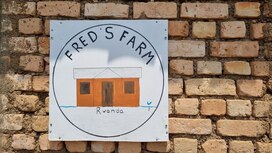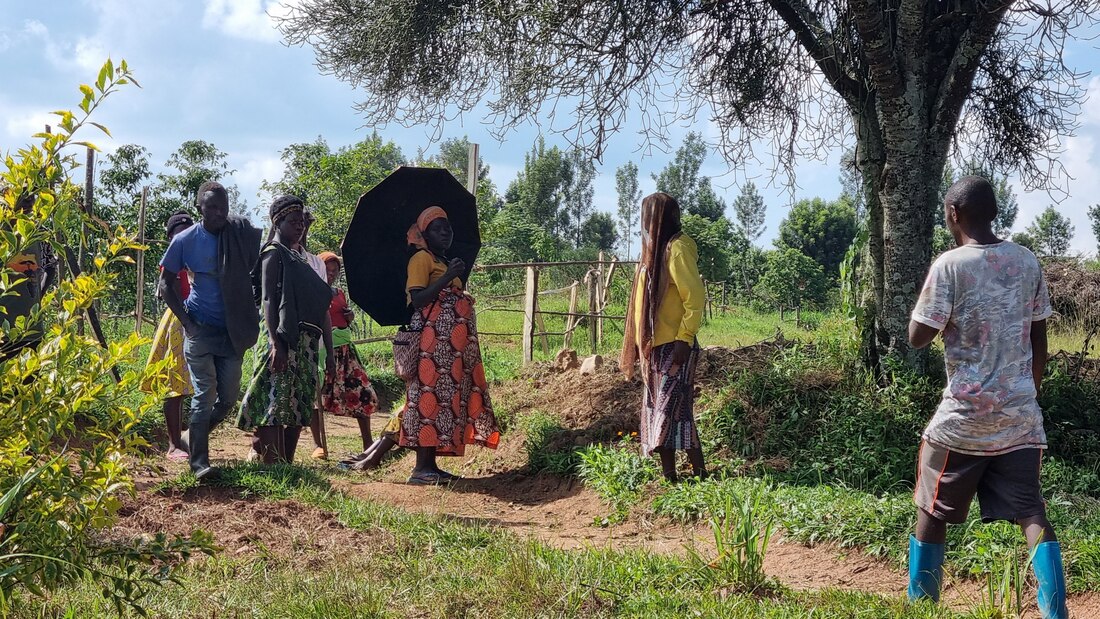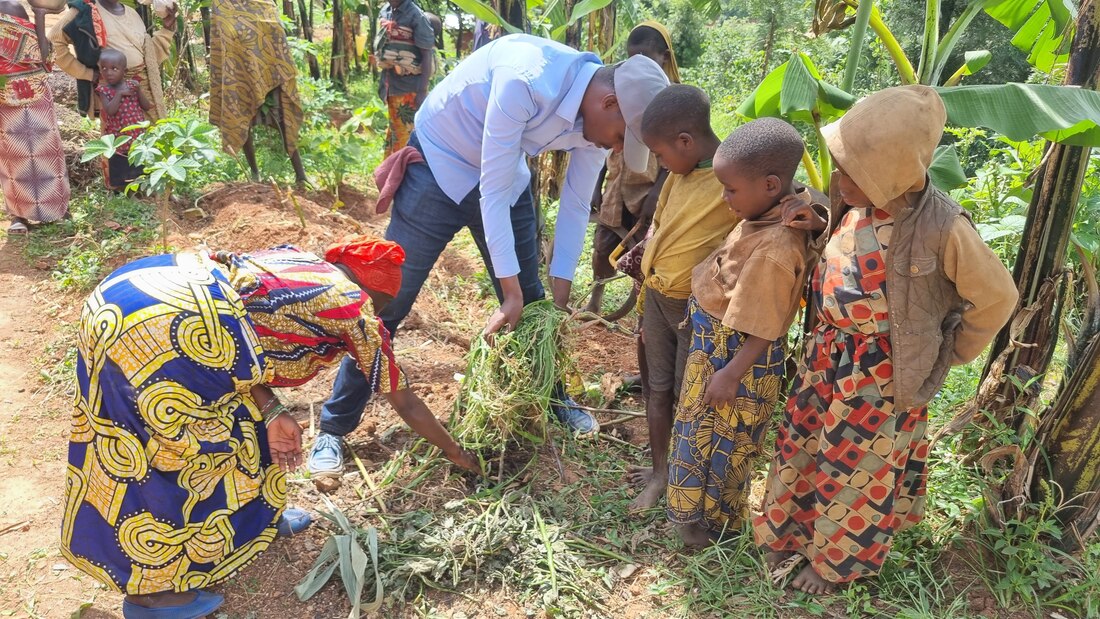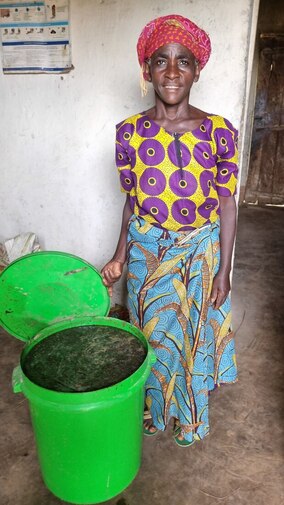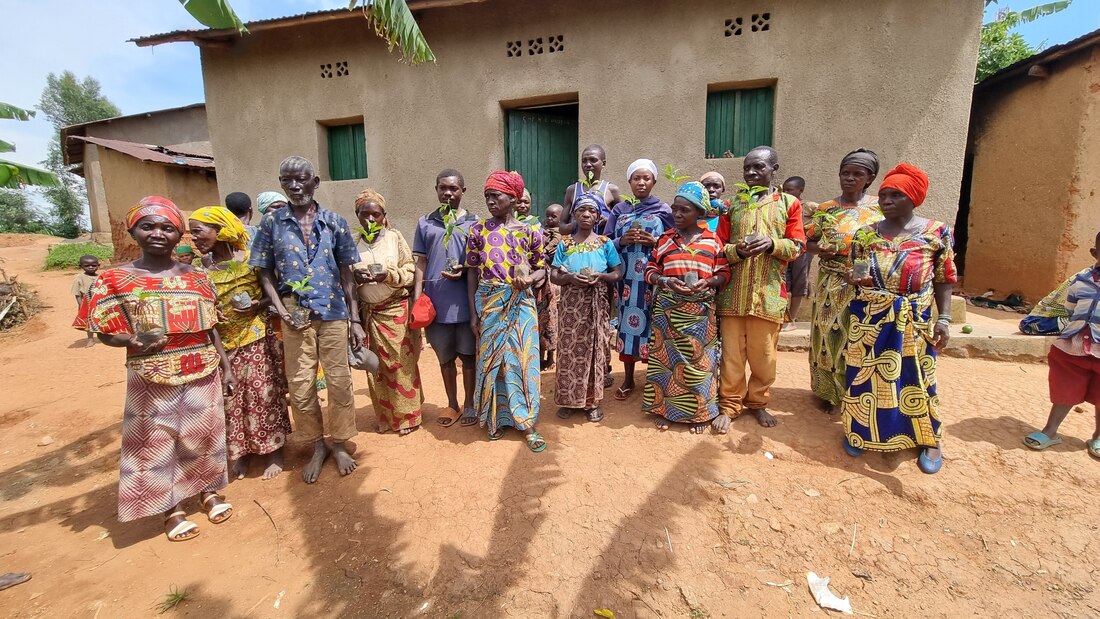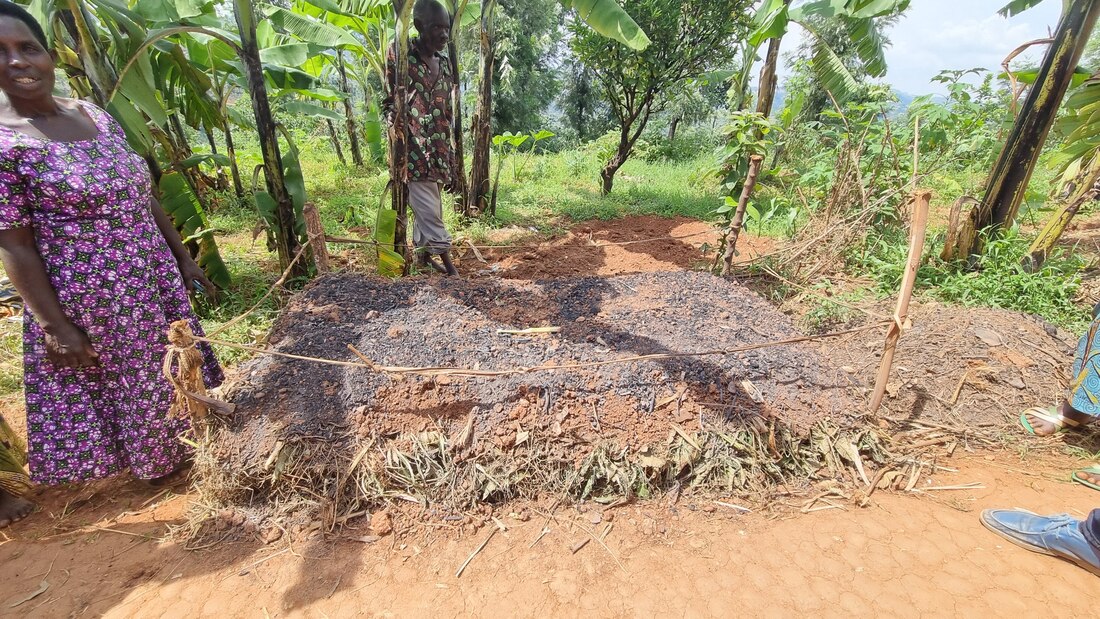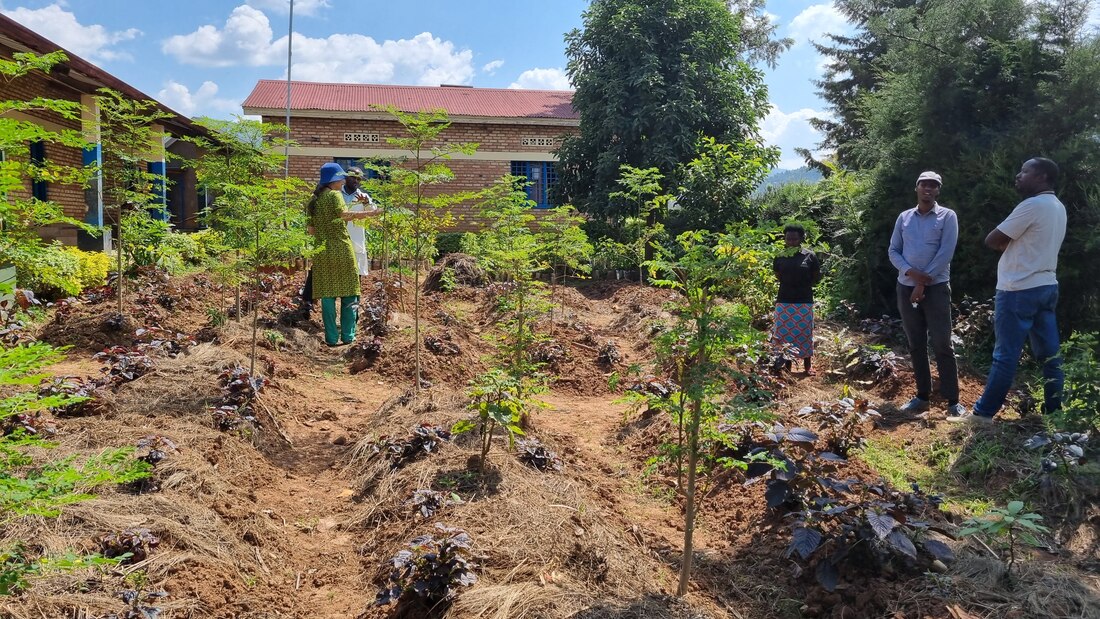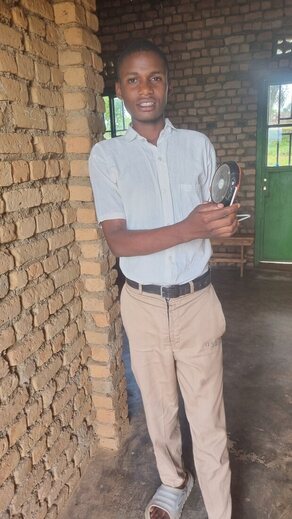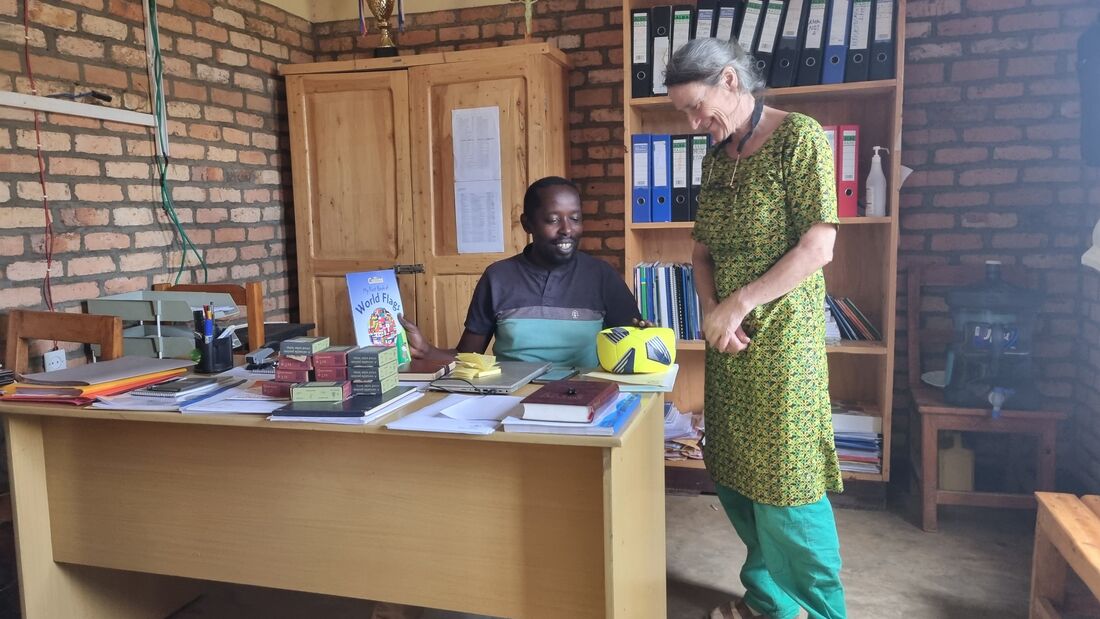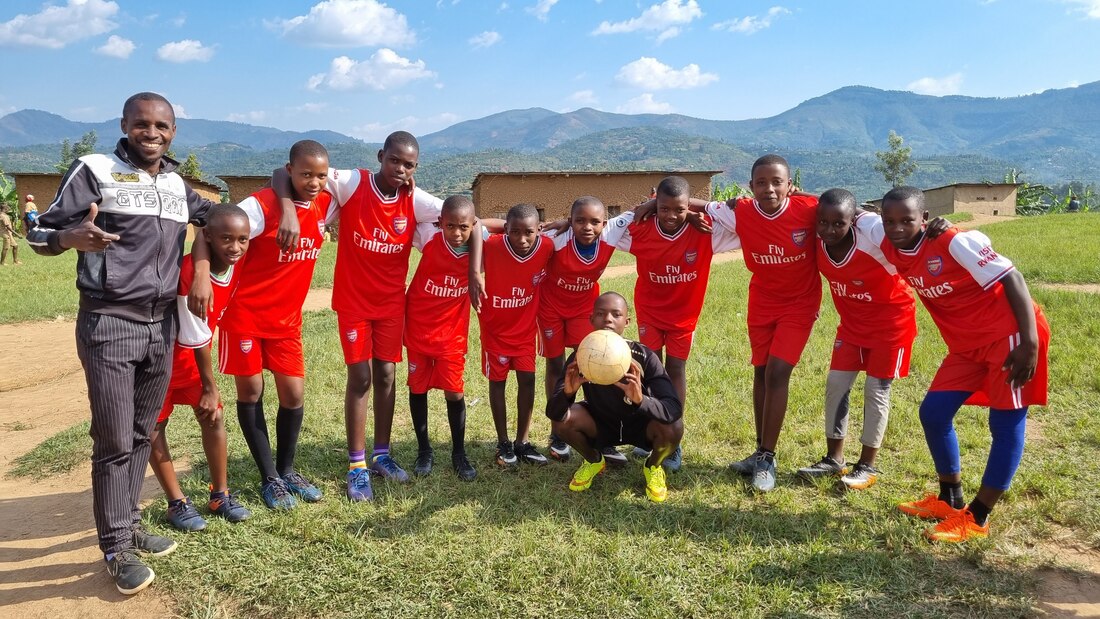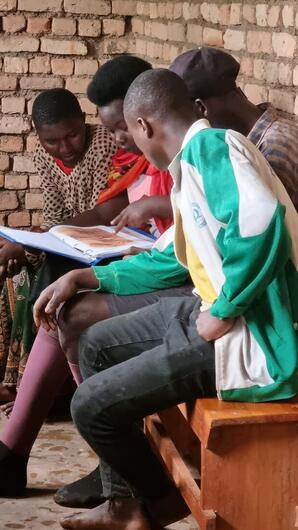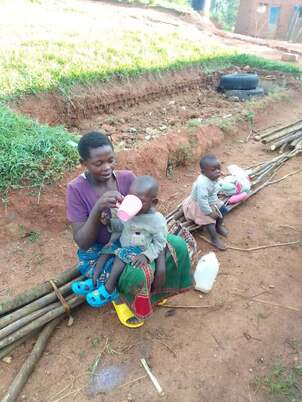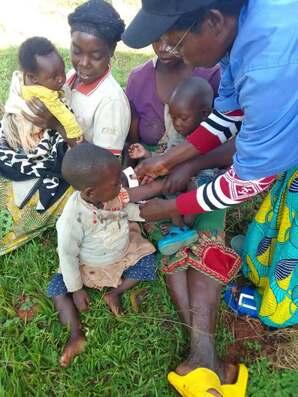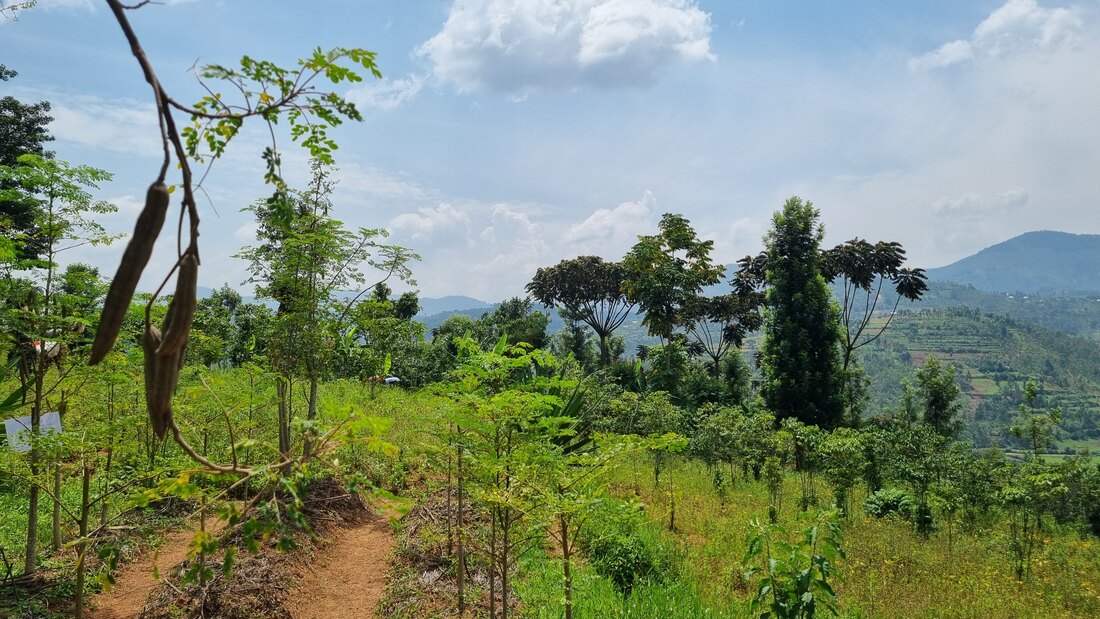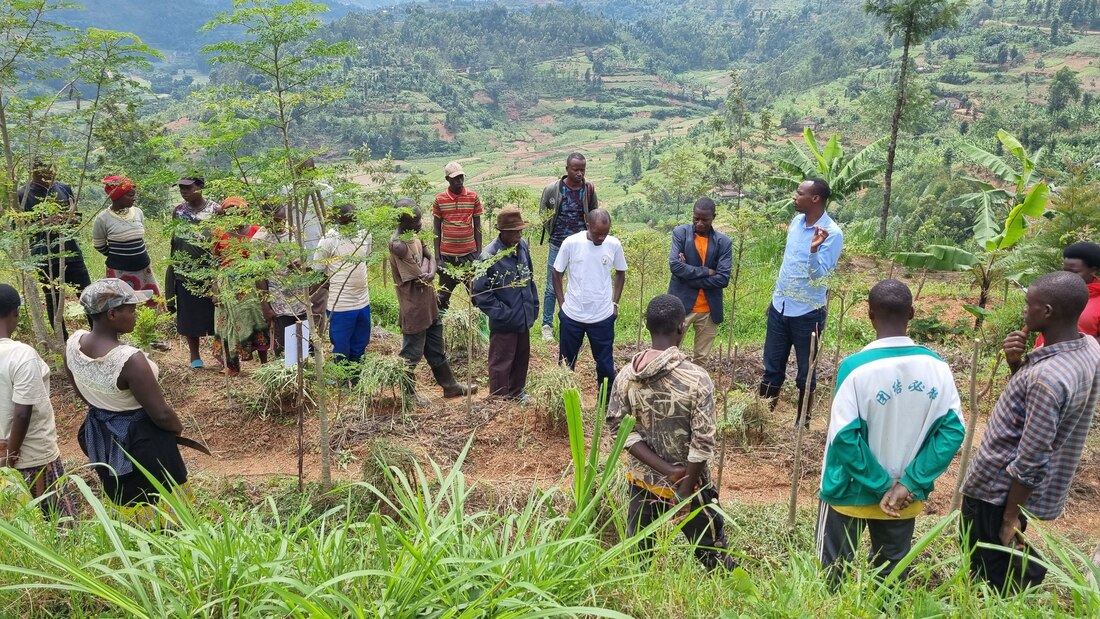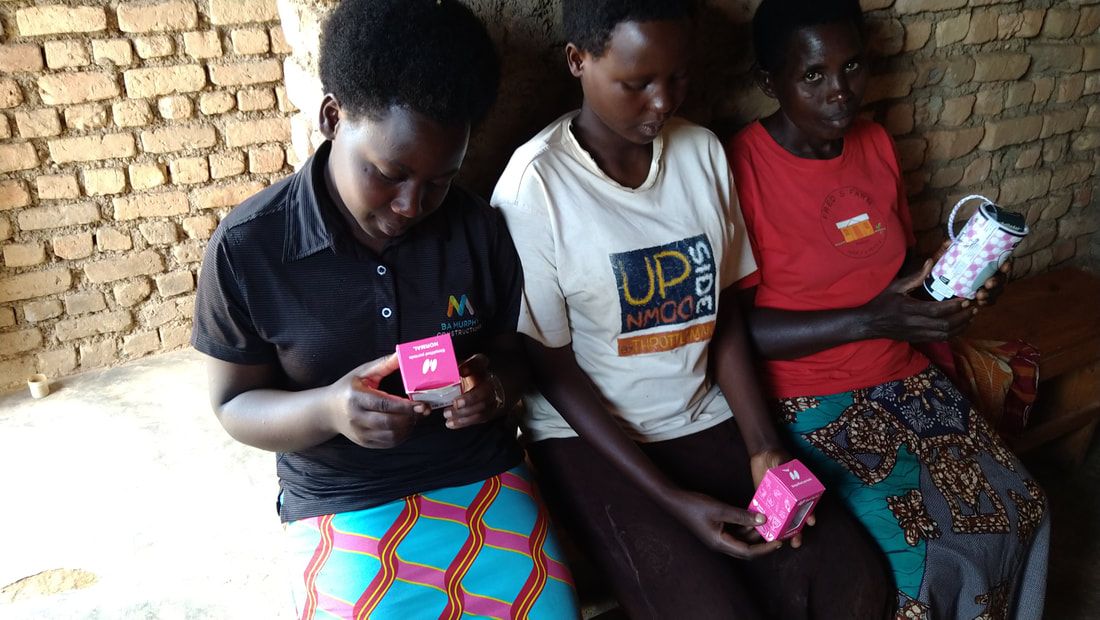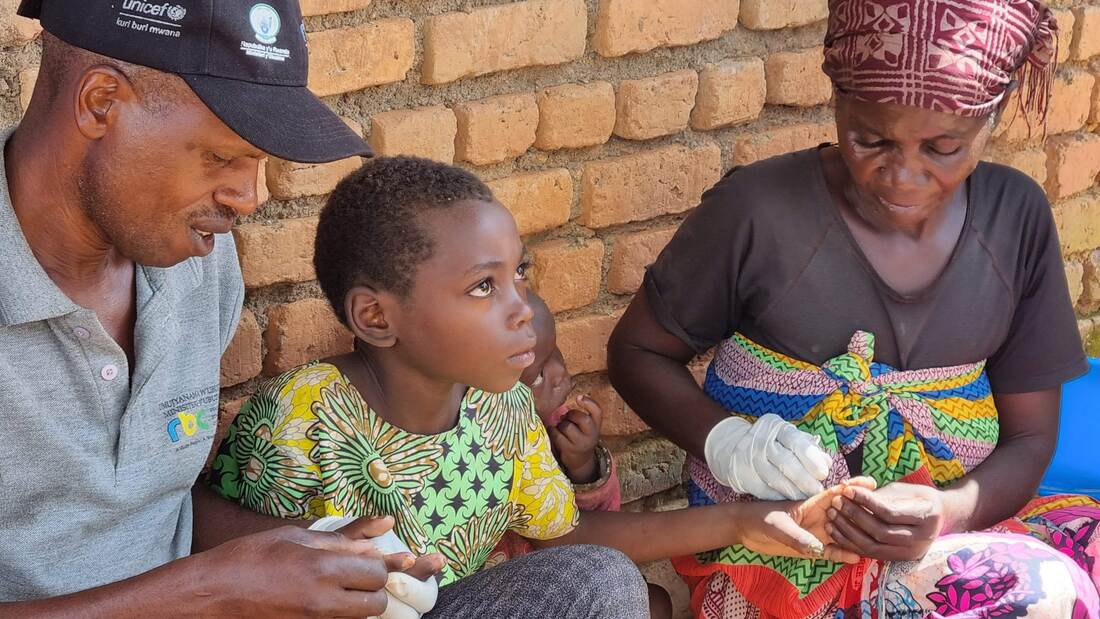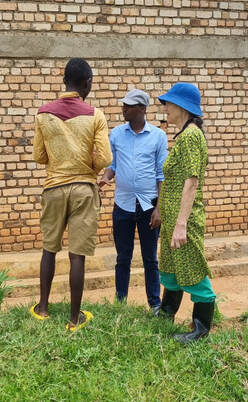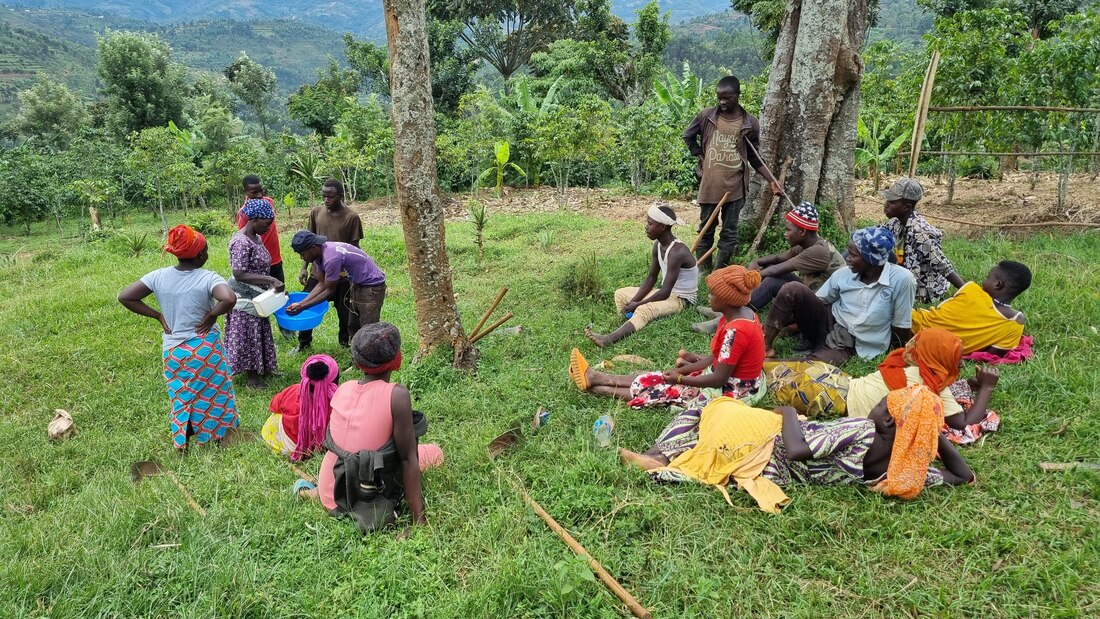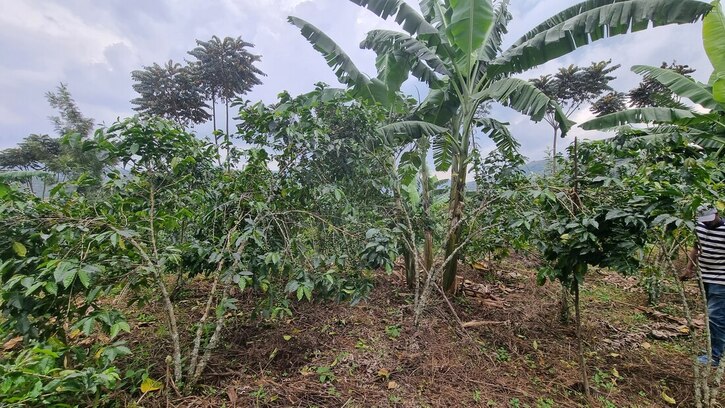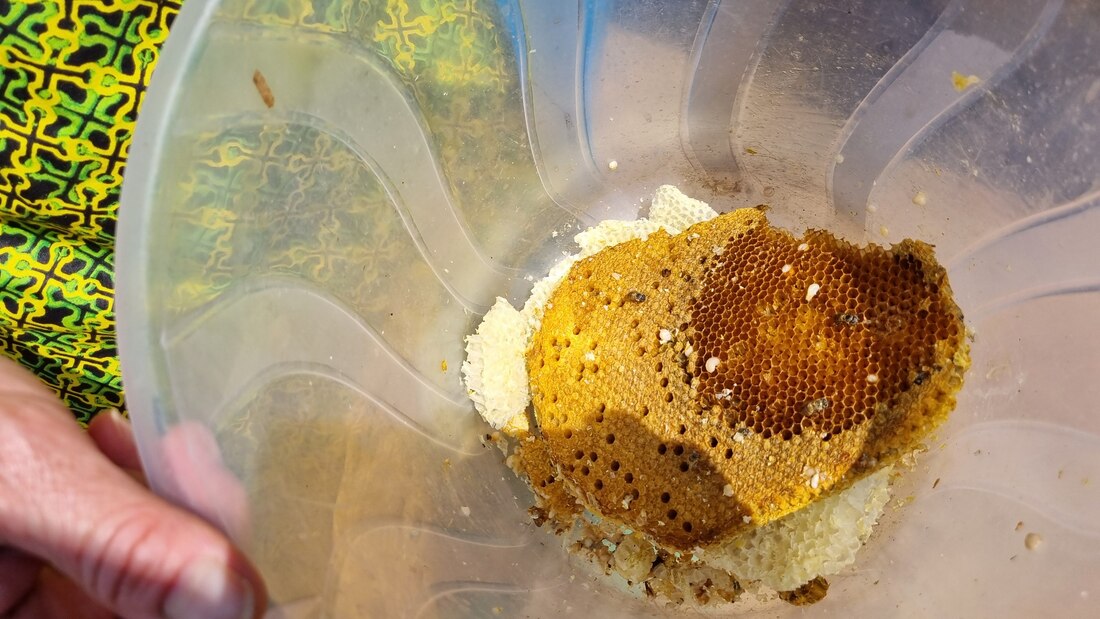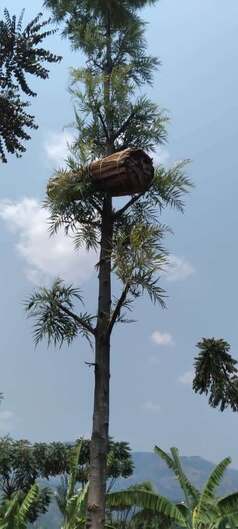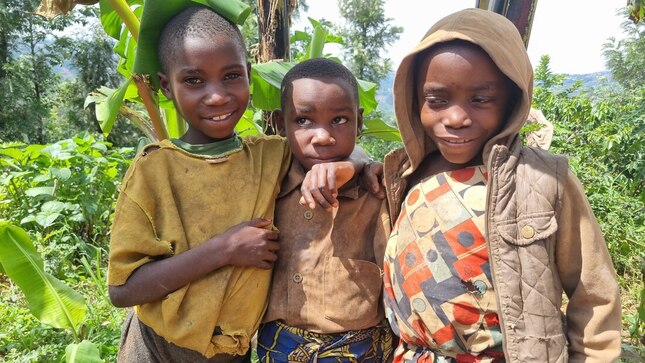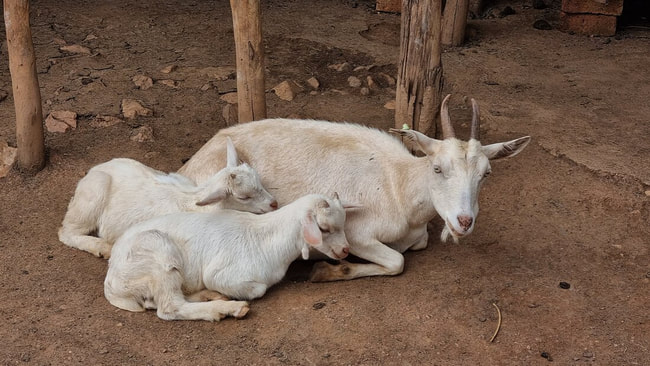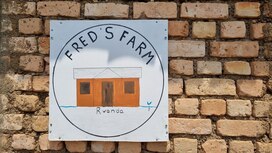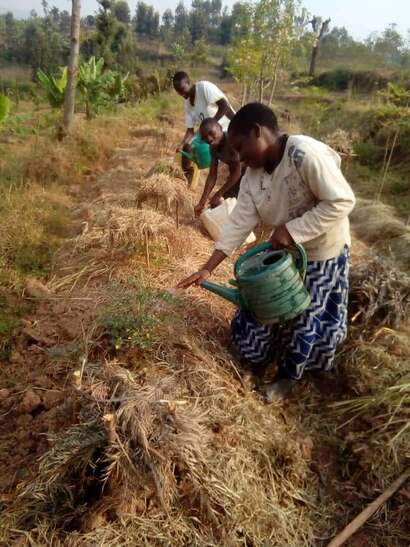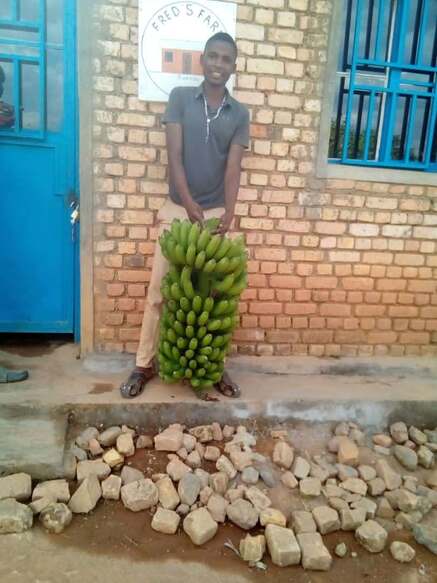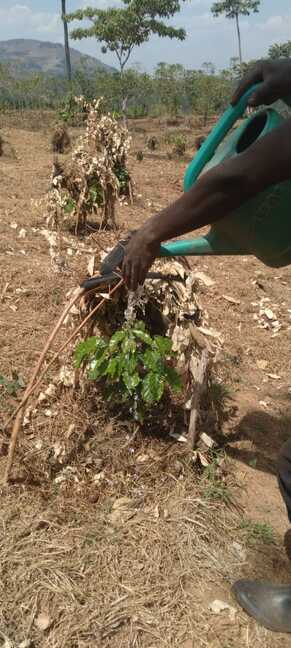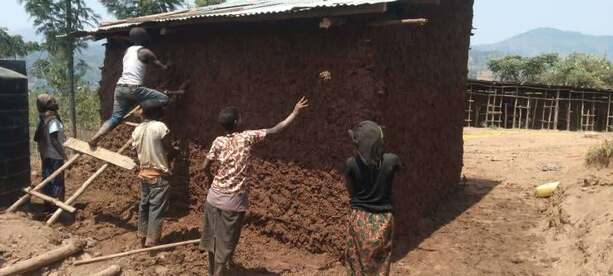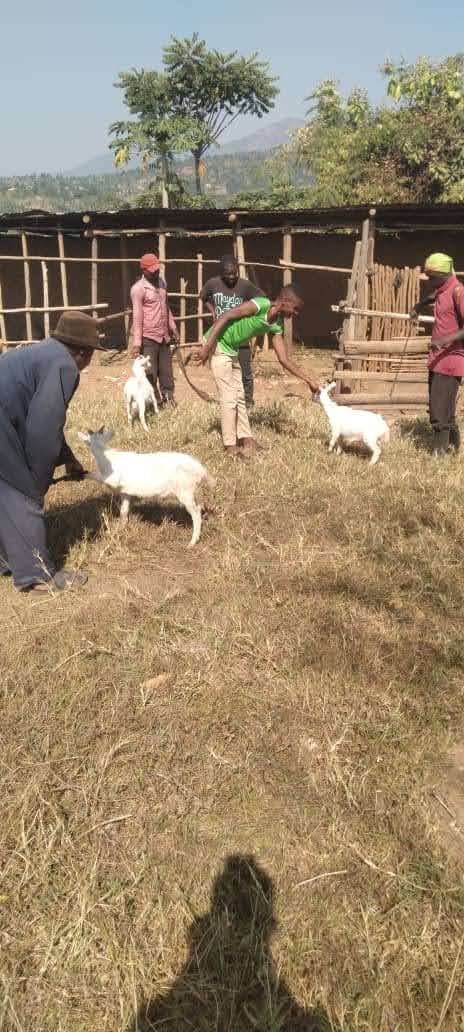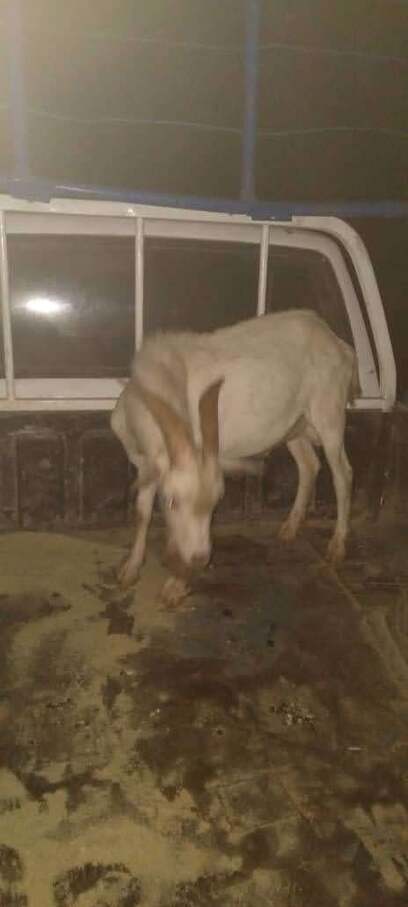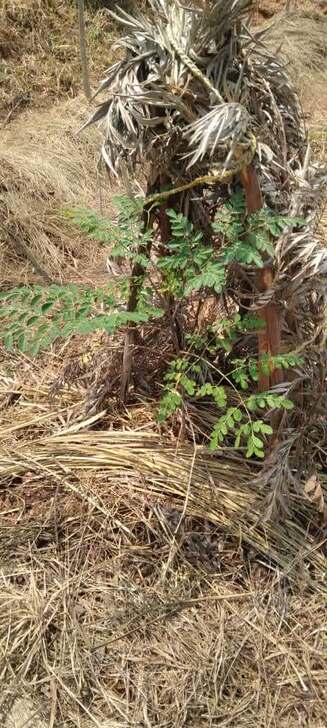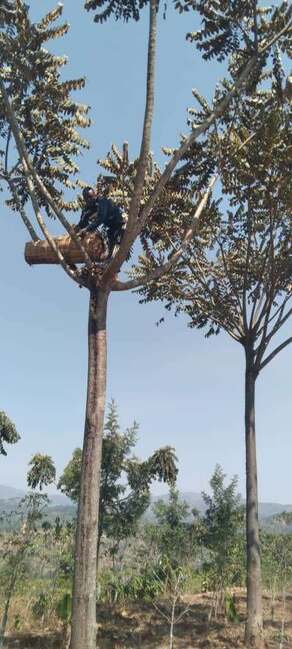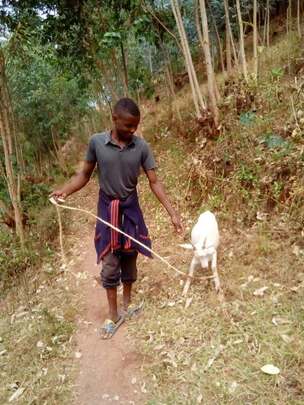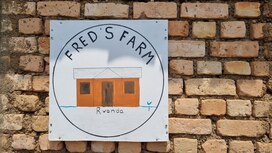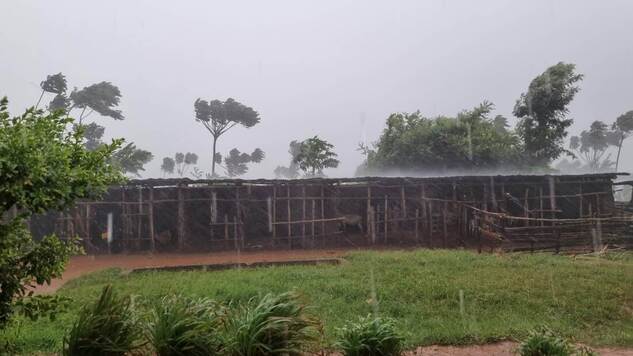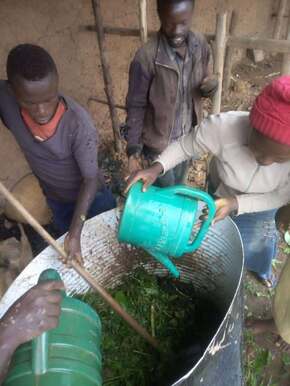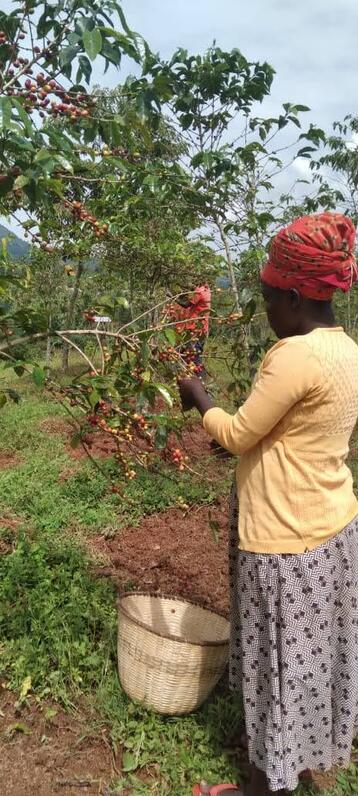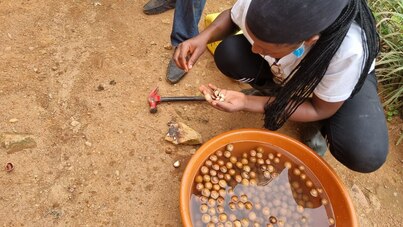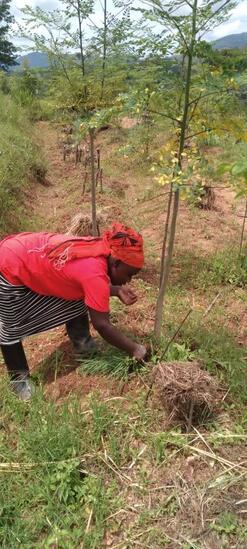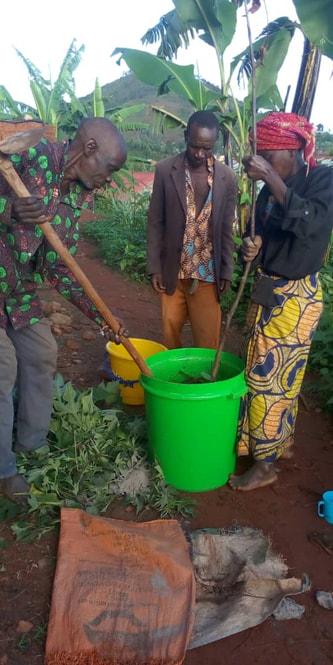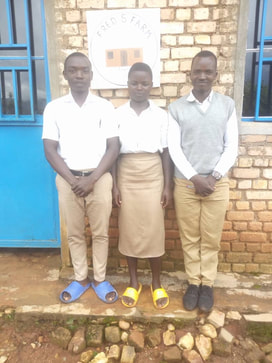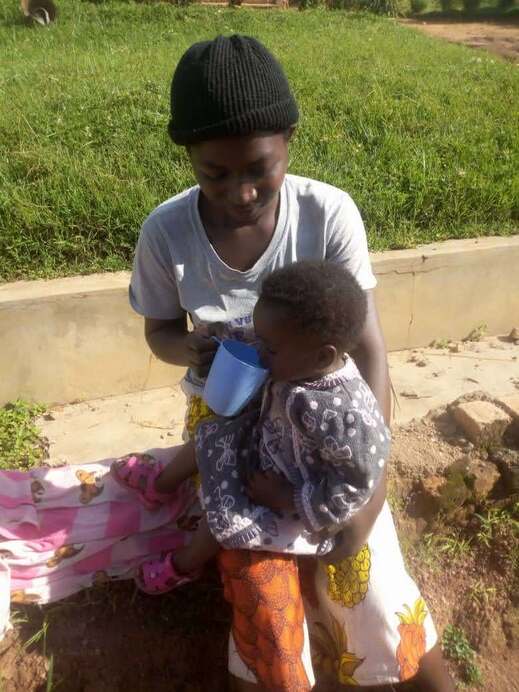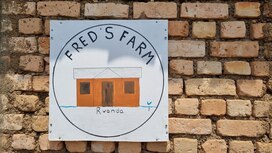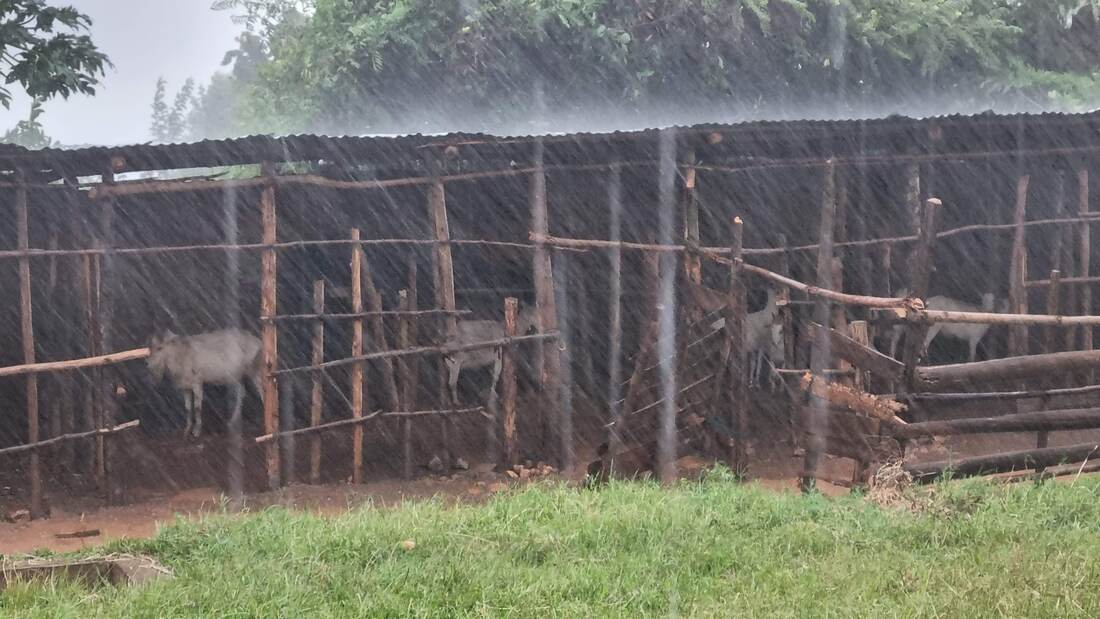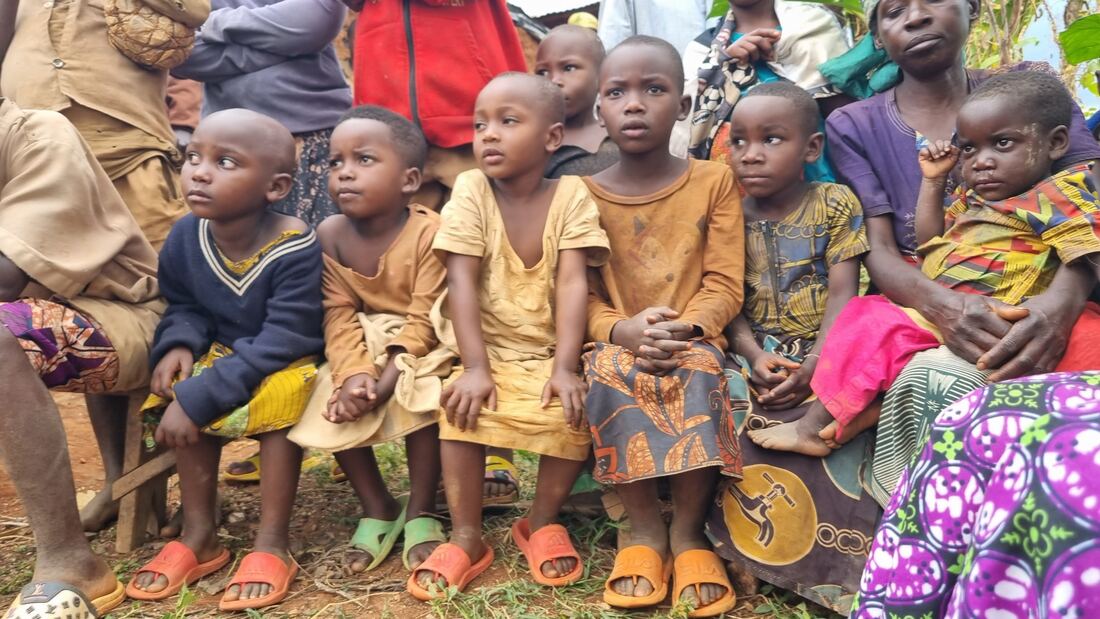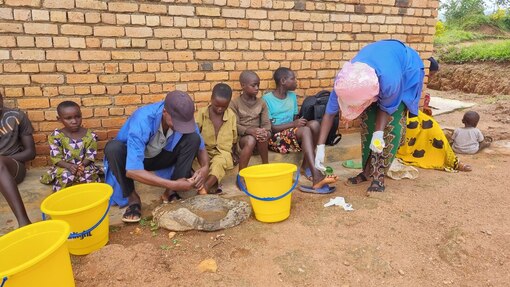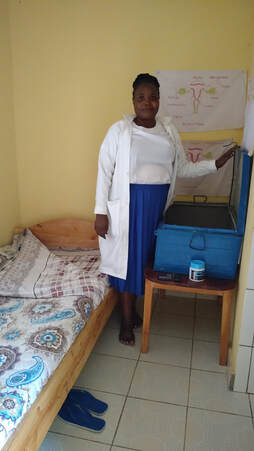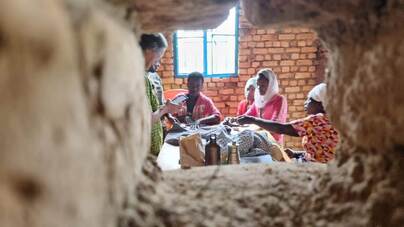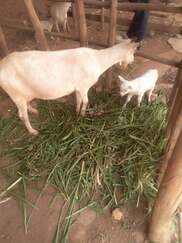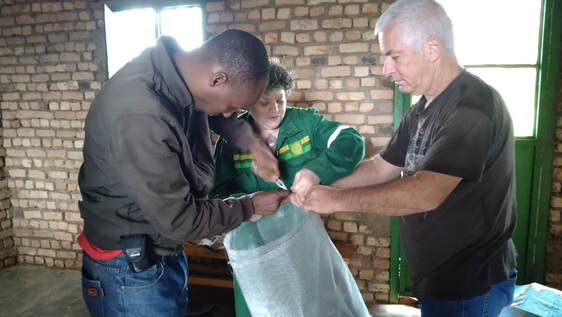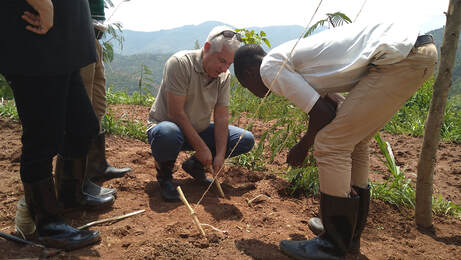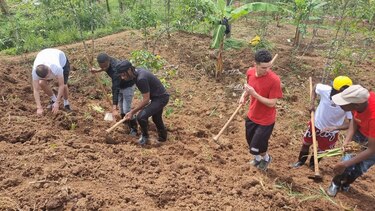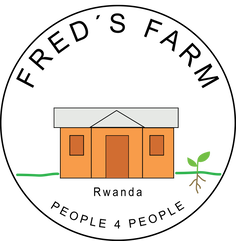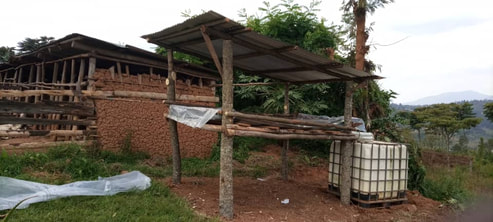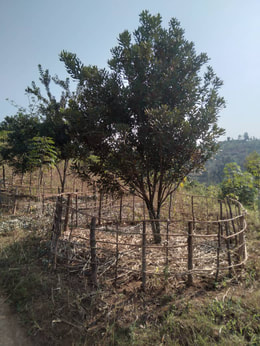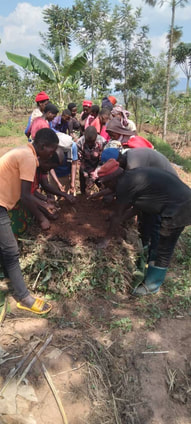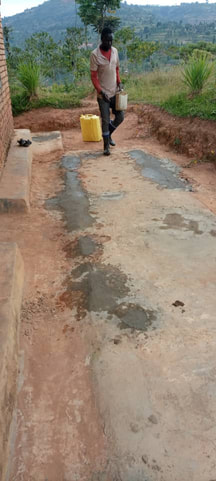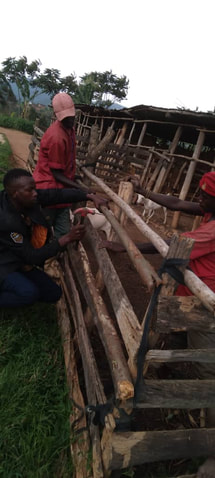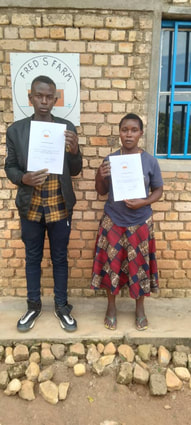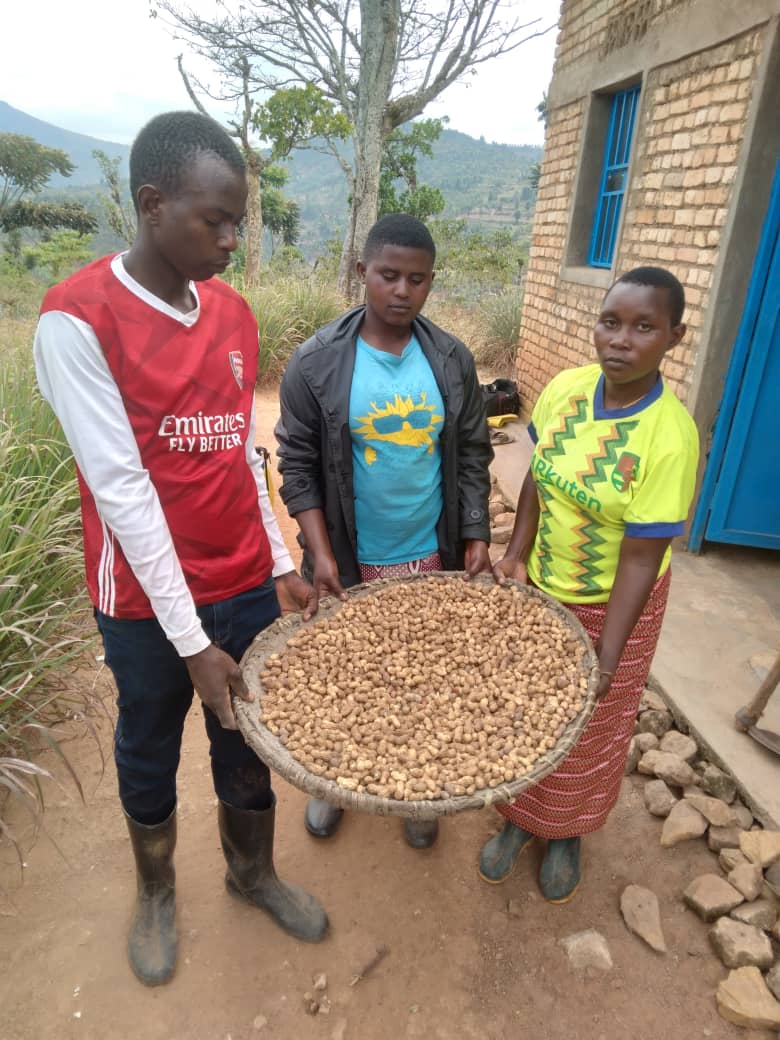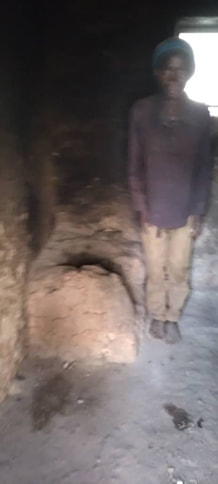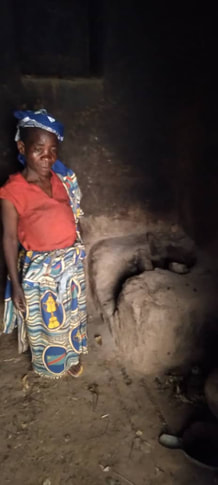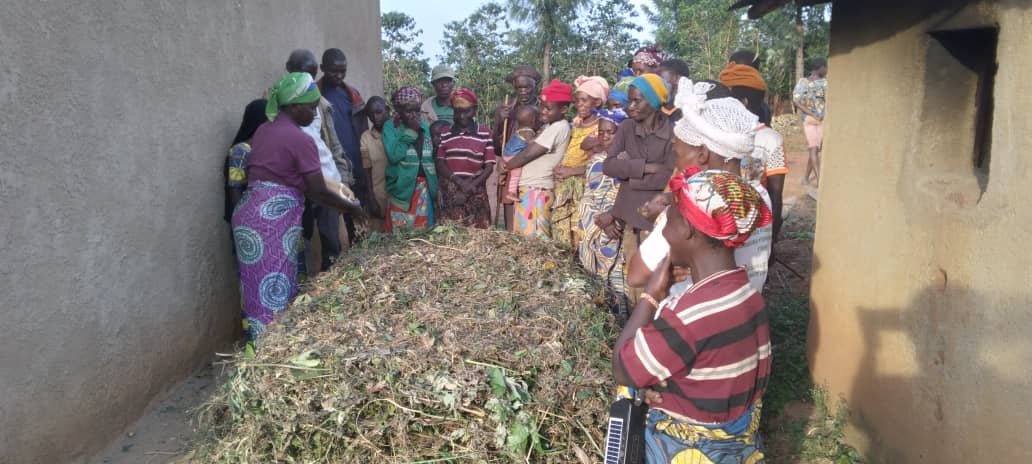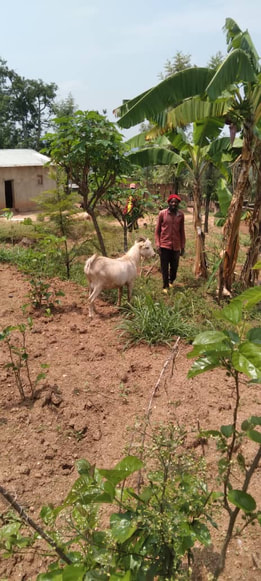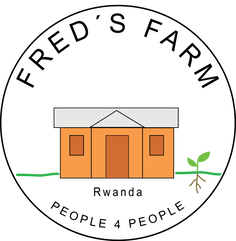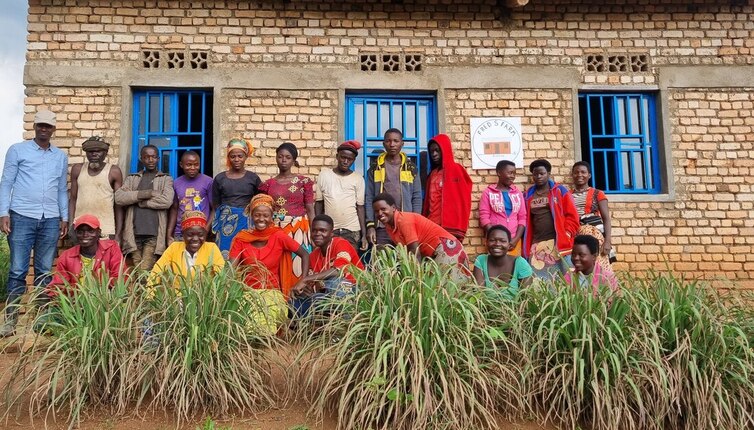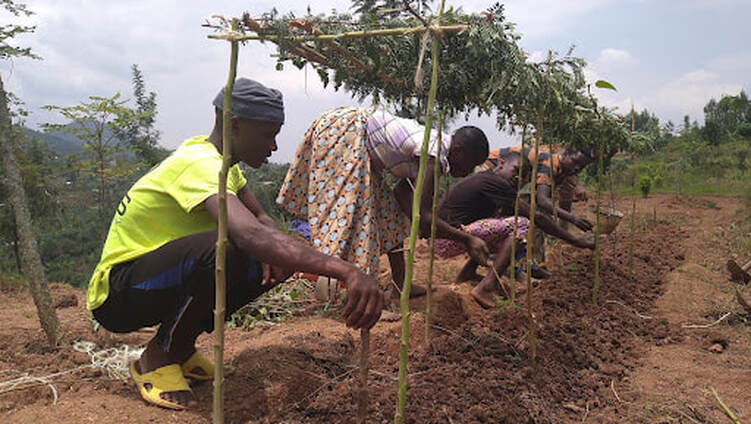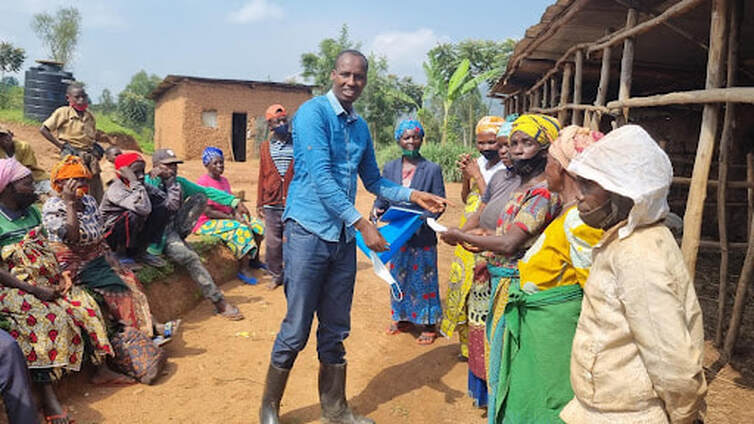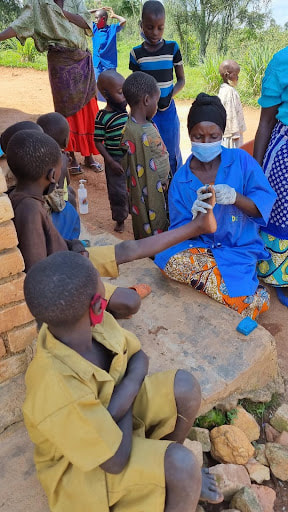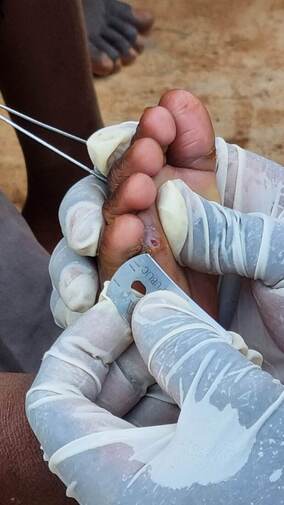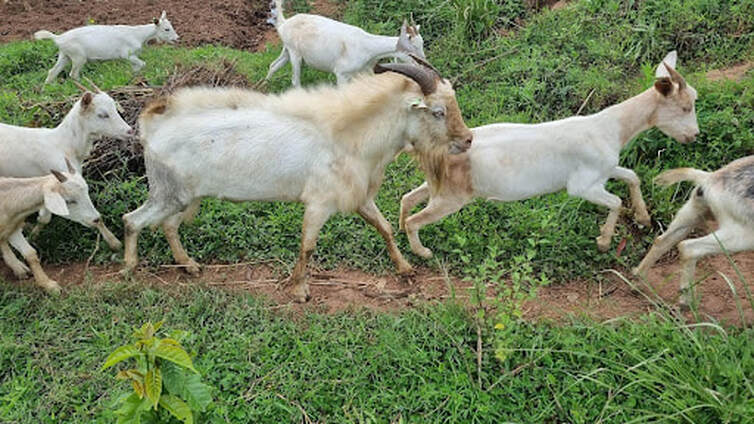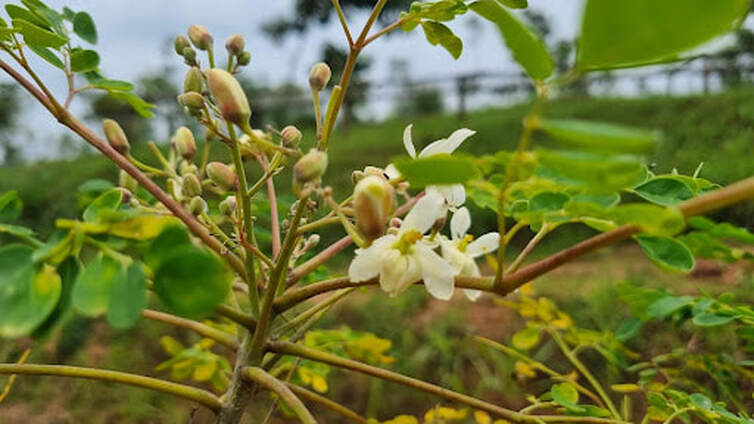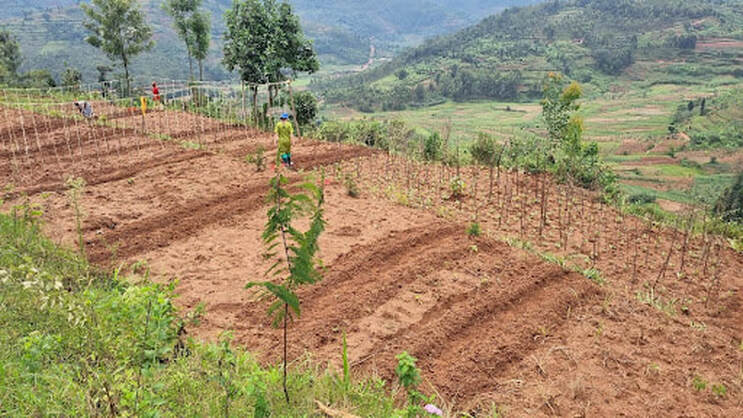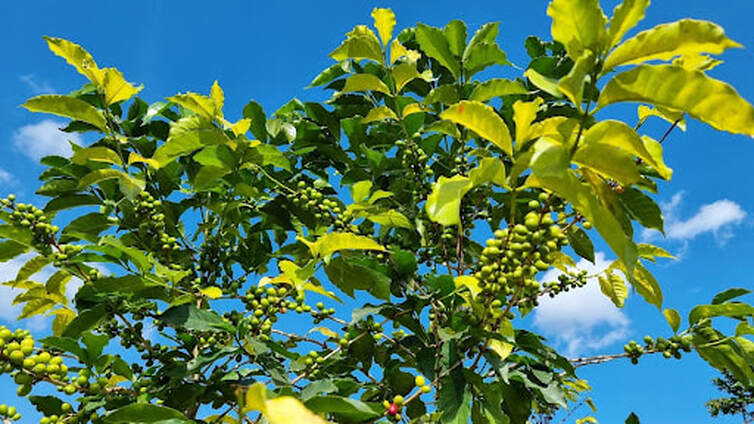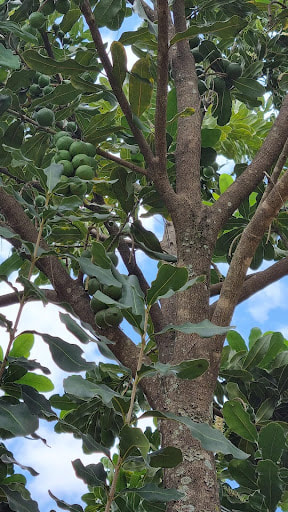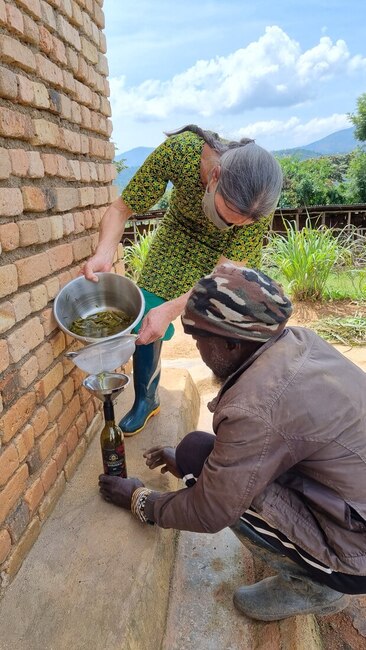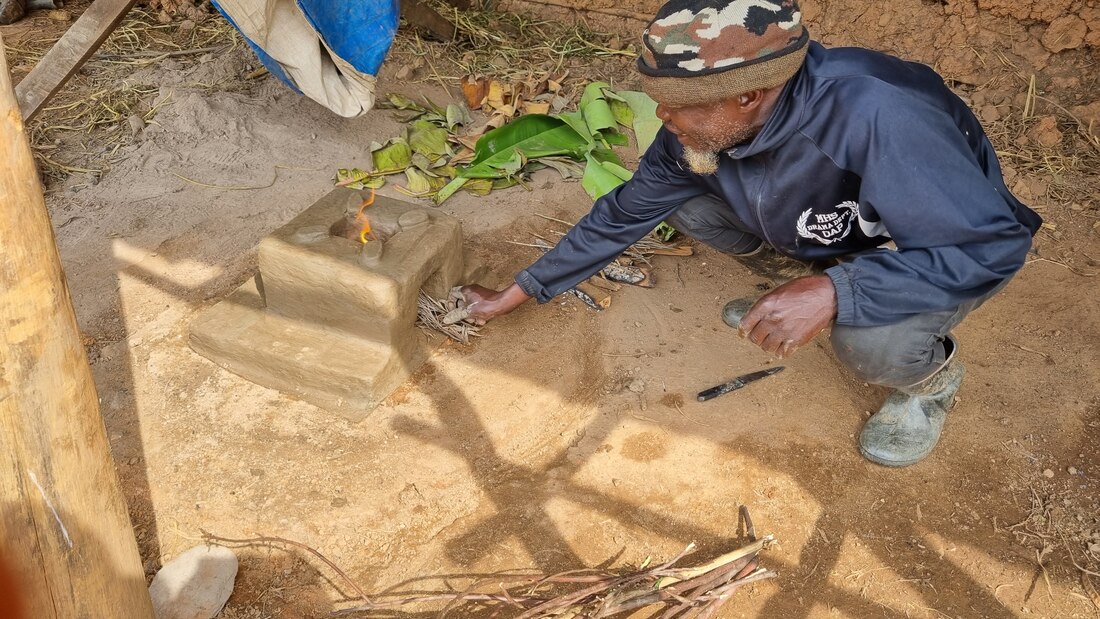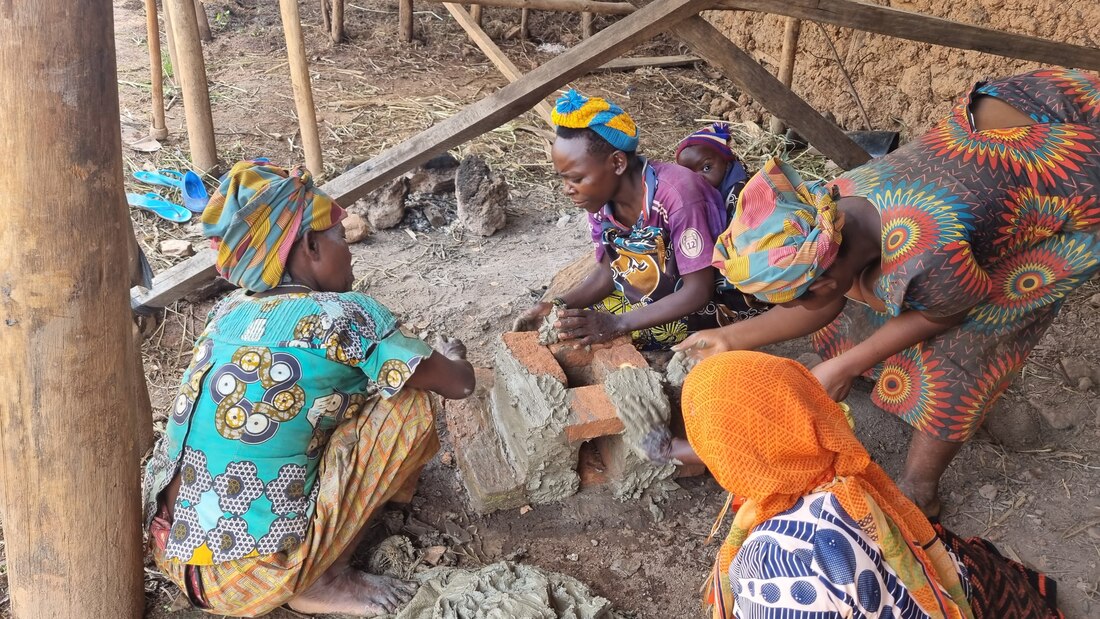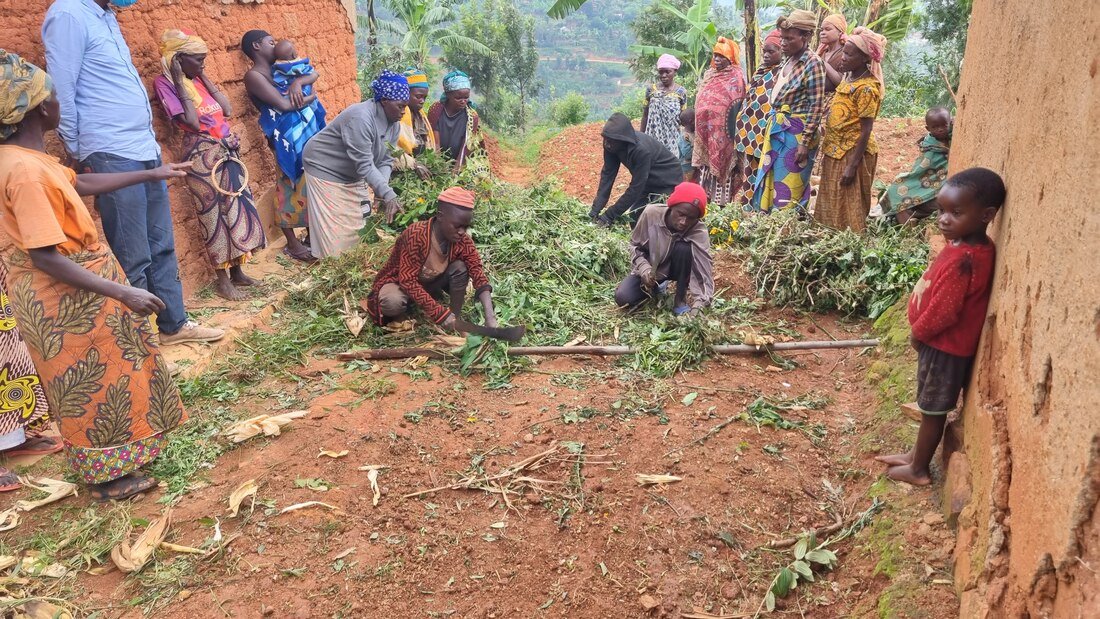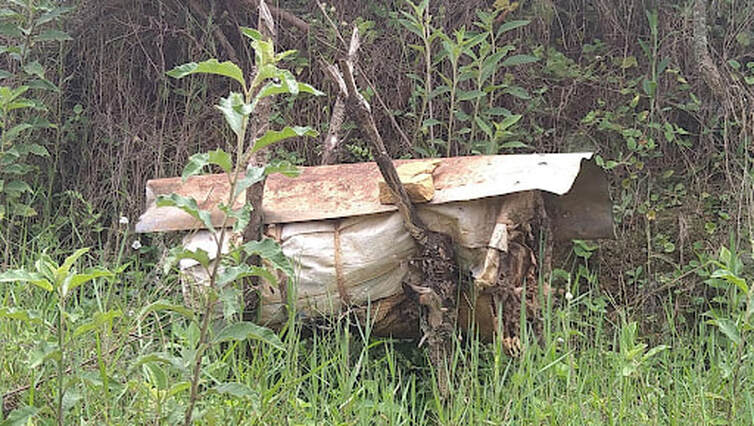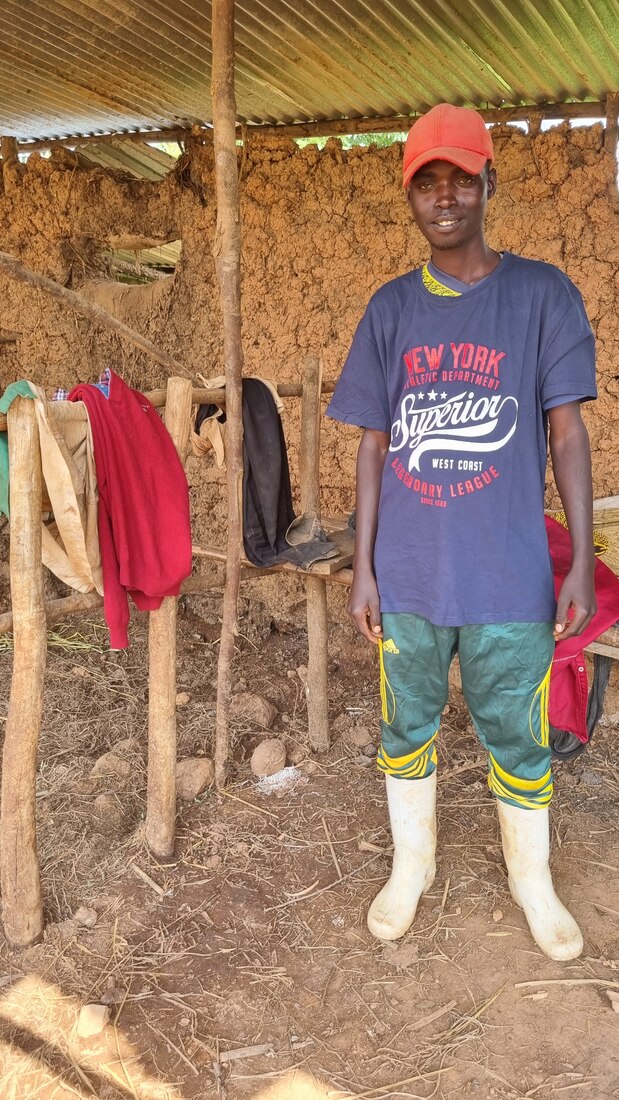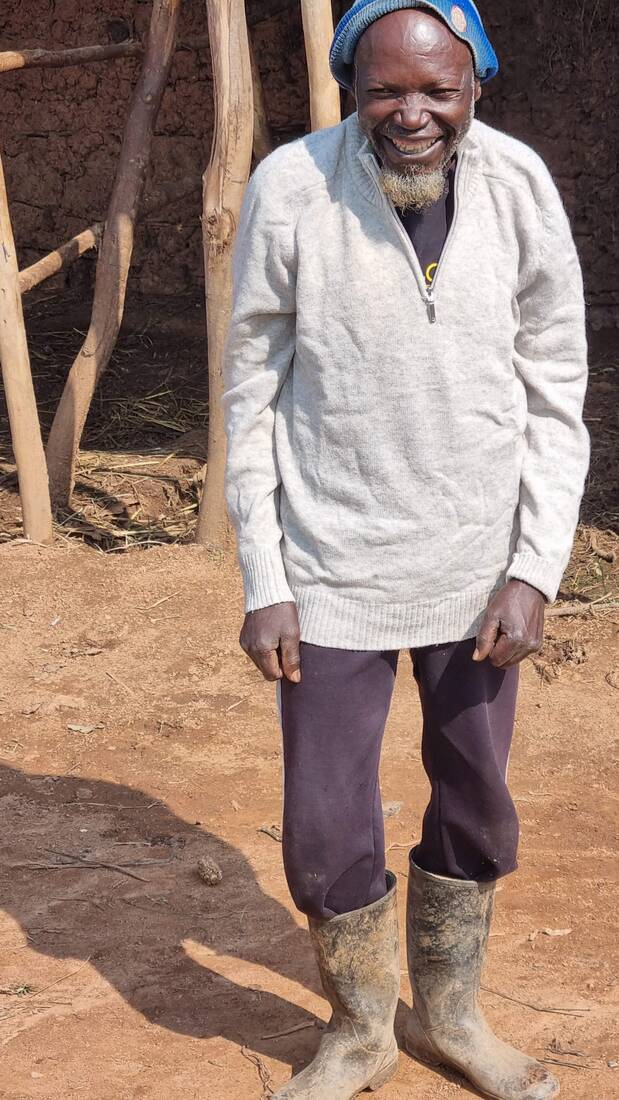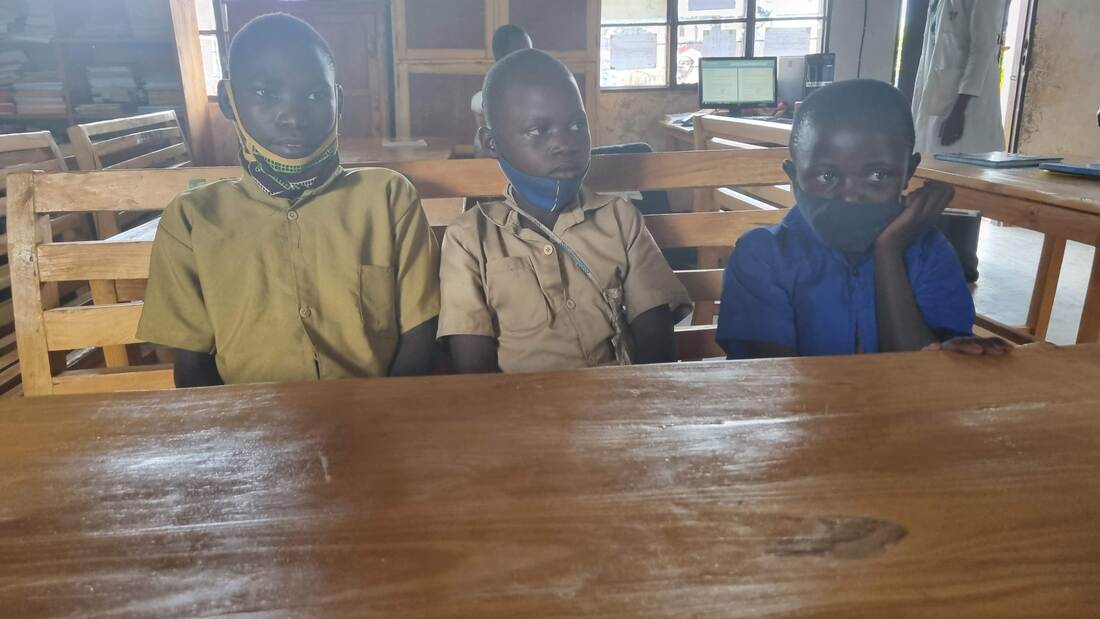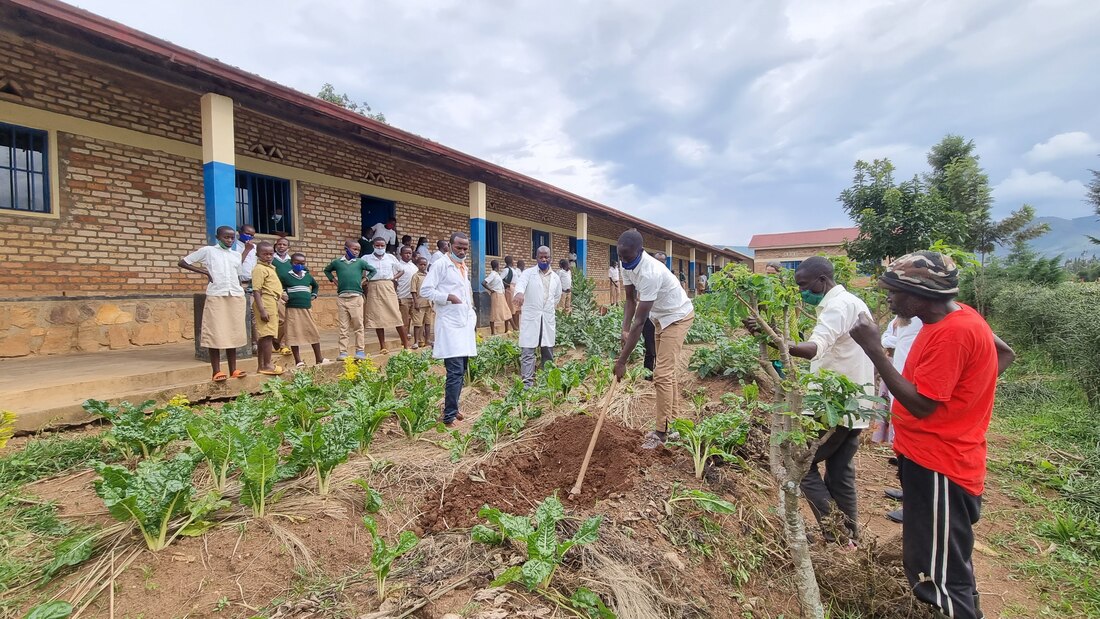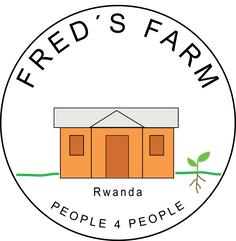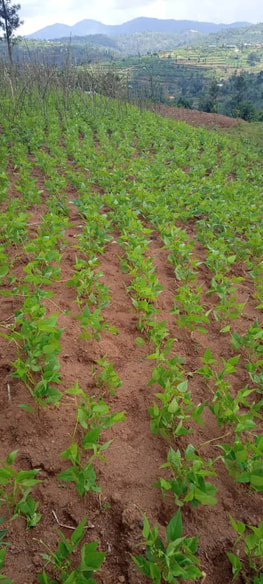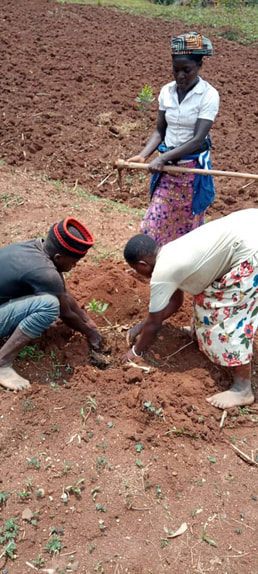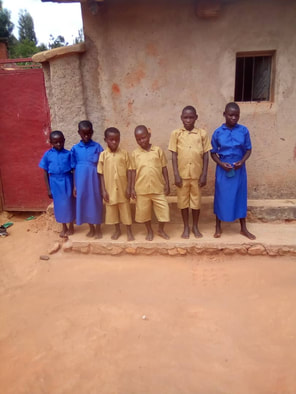|
The growing season is coming to an end and with that, less activities on the farm. The coming 3 months are hot and dry, so nothing is planted and the ground is covered to hold moisture. Villagers from the TWA village (picture above) have worked on FRED'S FARM to supply mulching materials, now they look for work elsewhere during the dry season. Community initiatives One of the biggest challenges in project work is follow-up. Many of our initiatives focus on the community succeeding with what FRED'S FARM teaches and supports. The farmers can be motivated, but don't succeed for different reasons. Both the dairy goats and the moringa tree have been a challenge. After some years trying different methods to follow up, in February this year we landed on the following; one employee from FRED'S FARM is in charge of each initiative. These employees were selected from former interns from the school program. After 4 months we see that this approach seems to ensure we have better follow-up. Each person has their individual record book. Jacques invites them to a weekly meeting to go through the records and discuss issues together. We now see a marked improvement in the moringa planted in the TWA village and at other farmers. In addition, we now have a much better overview over the crossbreeding program between pure breed dairy goats & local goats. So, we now think we've found a better way forward! Top left: Local doe with 2 crossbreed kids, 1 male & 1 female Middle right: Local farmer, Vincent, looks after one of the pure breed bucks from FF, & provides free "servicing" for local does. Middle left: the goat record book. Bottom left and right: thriving moringa saplings at the Twa village. The Farm There is an improvement in both coffee and macadamia harvest. This is essential as in the future, this is where cash for the project is going to be generated. Here too we have changed how we follow-up the daily work. One permanent member of staff has responsibility for macadamia, one for young coffee and one for established coffee trees. So, similar to the community initiatives. It's heartwarming to see how these young people Jacques has selected take on this responsibility. It is both a learning opportunity for them, and a great help for FRED'S FARM. Coffee and Macadamia The coffee harvest finishes this week, and the harvest is four times 2023 harvest:) The macadamia harvest is also increasing. For the coffee, the main factor for improvement is better management. For the macadamia, management is better and in addition more trees are producing nuts. It takes approximately 7 years for the trees to start producing nuts, and can take 15 years to reach full production. So macadamia is a long term investment. For general interest, on FRED'S FARM coffee harvesting takes place once a year over a 9 week period. Ripe coffee cherries are picked once a week, and carried immediately to the nearest coffee washing station. The coffee cherries must be washed within 8 hours of harvesting, so washing stations function throughout the night. Macadamia produces nuts throughout the year, so Joseline collects and records on a weekly basis. Mature nuts fall to the ground and must be collected as soon as possible as rodents damage those which are left on the ground. So "nut hunting" is an essential part of Joseline's job. Picture left - Weighing the coffee cherries at the farm Picture right - Picking coffee cherries Bananas The banana trees planted as shade trees for coffee are maturing and producing fruit, both sweet and cooking bananas. Most of the harvest is used as food for our staff, but surplus is now sold at the local market. Kids at school The 10 TWA school children we have supported this year will soon begin their summer holidays. The TWA villagers have told us that after the holidays, they plan to send 13 children to school. Very good news! When we started the project no kids from the TWA village attended school. Improved child health Since February, Brice, Agnes and Fabrice, have come daily to FRED'S FARM to receive goat's milk. Their nutritional status has improved markedly! The health volunteers use the recognised simple measuring tool, MUAC (mid upper arm circumference). Brice and Agnes have improved so much they don't need to come any more, but Fabrice is still borderline malnourished and will continue to come daily. Their mother has thanked "FRED'S FARM for caring for her children who were about to die and now come back to life". This mother has also a baby who is breast fed, and she received fresh moringa leaves to improve breast milk production. Agnes was treated for an extreme case of jiggers in February, and has remained "jiggerfree". The health volunteers and village leader will now identify new children who will be invited to receive milk. The threshold for a mother to bring her children can be high as it is an acknowledgment that she is not able to provide for her children. But in general, all who have been invited have, with gentle encouragement from our farm foreman Providence, brought their children. Again thank you for all support. Without it we could not continue to help the people in the area we are working.
0 Comments
Visit to FRED’S FARM (FF) 29. January - 17.February 2024 Arriving in Rwanda from snowy winter Norway is always a shock to the sensory system - intense colours, people, clothes and vegetation! This year GREEN was all the more intense as the wet season was exceptionally wet, leaving the farm looking even more lush than “usual”. On our planned first day at the farm, the main road was closed due to a landslide. Some of the staff heading home at the end of the work day. TWA village On entering the Twa village, we are warmly welcomed and ushered to a bench placed in the shade under a banana tree, with the villagers sitting facing us. Here they give an update on the current state of affairs. Top of the list was informing us that 10 children are currently attending school, and from September they plan to send 13! One young mother pressed herself through the crowd to tell proudly that her son had come top of the class - this triggered applause from everyone:) The whole village feels pride in this child’s achievement. The atmosphere oozed “we can, and we will!”! During the last year the Twa have followed up making and using liquid fertilizer, compost and cultivating very small snippets of land around their homes. On our visit to the village, four women proudly showed us their newly germinated moringa. One of FF staff had supported them in this, and Pascasie will now assist to ensure these survive, and more seeds are planted. It is almost a miracle that these little seedlings survive as the areas available for planting are the same as where all other activities take place; making clay pottery, children playing, a path through the village…. one thing happens on top of the other, and little attention is paid to plants. But these tough and patient women, including Alice the village leader, are determined to succeed. KIZI SCHOOL The school principal, the farm and sports teachers always set aside time for our visit, and actively engage to develop ideas. Books for the school library, a few footballs and this year a set of football boots for the whole girls team was met with enormous enthusiasm. The sunlamp library functions well. Pupils in the last year of school, working for national exams, are prioritized. But there aren’t enough lamps for all these pupils. FF supplied 10 new lamps. Some teachers live at the school. With no electricity, it’s a challenge for these teachers to do preparatory work after school hours in the dark. We will look into options for improved lighting. The kitchen garden at the school continues to improve, and they have now established moringa with regular follow up from Pascasie from FF. The moringa is planned as food for the youngest children. For the past 2 years the school has had a few pigs, and on our visit the principal asked if there was any possibility for the school to get a dairy goat. He sees this as an opportunity to provide milk for the children in the nursery school. The school has regular meetings with parents, and this is a golden opportunity to promote goat milk for improving children's health. We have made a formal agreement, a trial one year period. INTERNSHIP PROGRAMME Time limits didn’t allow us to gather former interns on this visit. But the school manager and farming teachers assure us that this initiative gives a chance to those who need it most. The pupils who are prioritized for participation in the programme, are those with the most challenged home situation. The Demonstration Plot which the interns continue to develop, is maturing and beginning to be a true demonstration plot. Trials with different methods of planting to get the best harvest, and utilizing the 3D potential of the plot provide a learning area for the students. Two former interns are now working on FRED’S FARM; Pascasie, our moringa specialist, and Elie, our night watchman who will now also follow up dairy goats in the community. These 2 young adults are highly motivated, and extremely diligent in executing their jobs. Our moringa specialist, Pascasie, teaching interns indoors on a wet afternoon DAIRY GOATS We invited the vet to lead a training session with our goatherd and the farmers who have, or have had, dairy goat bucks from FF. The aim was to learn how to keep the goats healthy, and detect the first signs of sickness. Via FRED’S FARM homepage, we have received many enquiries about dairy goats. Two different groups visited FF during our visit; 4 academics from the Rwandan Institute for Conservation Agriculture (RICA) and 3 employees from a Rwandan NGO. RICA were interested to hear our experience both on the farm and in the local community. The NGO is hoping to start a dairy goat project not so far from FF. Both of these parties can be possible collaboration partners, and we plan to keep in contact. The focus from these 2 visiting groups, and their practical input, was valuable both to learn but also as a real motivator for Daniel (the goatherd), Jacques and ourselves. The follow up of dairy goats in the community has not functioned as intended, primarily due to poor follow up from FF. It has taken time to understand the stumbling blocks, but we see it’s necessary to dedicate time and money to this effort, otherwise it just won’t work over time. So now Elie, a former intern, has the formal responsibility to follow up farmers in the community with purebred dairy bucks who “service” local does, and to have an overview of the first generation of crossbreeds. Three goat kids were born on FF just before our arrival, and just prior to our departure, 2 mothers were invited to bring their children to receive goat's milk. We had also invited a local health volunteer to be present to record the nutritional status of these 3 children. These mothers will come daily at milking time over the next 2 months. The mothers also receive some fresh moringa. Left - A needing child getting goat milk Right - Measuring nutritional status MORINGA, the “miracle tree” To see the mini moringa forest on FF was a true joy! We have really struggled to succeed with this, but now, thanks to Pascasie and increased knowledge of crucial steps, all stages of moringa propagation are healthy - new seedlings, saplings and trees! 364 plants in all! Pascasie keeps an eagle eye on drying, and storage of the dried moringa. Visitors to the farm are now able to see all stages of growth, the drying process, and sample both dried and fresh moringa. Most of our stored dried moringa is now taken to the Twa village where pregnant and nursing mothers are given “medicinal doses” of moringa by the village leader, and our farm manager, Providence. In addition, mothers who bring their children to get goat’s milk at FF, also receive some fresh moringa. Roll -out to the local community has not functioned well, due primarily to our lack of what we now understand is essential, closer follow-up from planting of seeds until the plant is approx. 40cm. From now on, Pascasie has a defined role to assist those who are motivated to grow, and receive seeds from FF. Many people in the local community, including those with key roles in the community (village leader, vet, voluntary health workers, teachers), are interested to learn and try to grow. Left - The moringa field at the farm Right - Local farmers, leaders, vet and staff learning about moringa HEALTH initiatives In previous years, we have invited anyone from the Twa village with the condition “jiggers”, tungiasis, to come for treatment to FF. This year we were informed by the local health volunteers that “jiggers” is now under control in the Twa village, a wonderful step forward! So this year it was an “open invitation”. Our farm manager Providence managed to motivate and encourage 10 children from the area to come for treatment, and also one young mother. In this condition, a parasite enters the skin and lays eggs at their point of entry. Most are affected on their feet but this time round, 3 kids also had lesions on their hands. All three were listless and apathetic, unfortunately a sign of poor nutrition. These children were invited to get milk at FF on a regular basis. One new initiative while in Rwanda was a trial with menstrual cups. Three permanent employees were offered these, and eager to try to use them. In the past years we have been made aware of the challenges of menstruation in the local community; restricted access to clean water and little or no means to make or buy sanitary products. This results in girls not attending school, or not able to work apart from in the fields. Last year we supplied a menstrual cup to our agronomist’s wife who has now one year of positive experience. She is willing to mentor these 3 young ladies who work on FF. Another mini step forward is that our goatherd Daniel has started to use his mosquito net, something he just refused to do before. His mosquito net had been so used it was in dire need of repair. Supplied with needle and thread, he did an excellent job in making it whole again:) His example led to Alex, who manages the homestead and its immediate surroundings, saying he too was motivated to use a net. They both sleep outdoors at the farm. 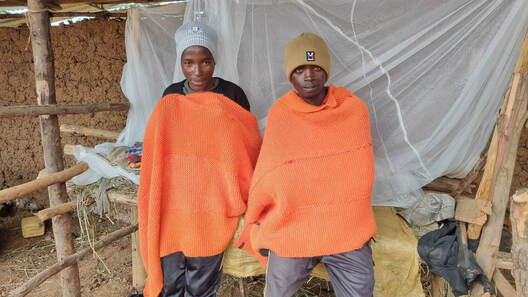 Top left - female staff introduced to menstrual cups Top right - Treating jiggers Below - Daniel and Alex with mosquito net and warm wooly scarves, converted to blankets:) STAFF FF has a policy to give work opportunities to as many as possible. In practice this means that apart from the permanent staff (9 people), there are 10 new staff every second week. We try to give work to those who need it most. On the other hand we need skilled staff who are able to work independently, able to cooperate and are trustworthy. At the moment, our permanent staff are dedicated and motivated. On our visit, we made considerable changes to clarify areas of individual responsibility. Pascal and Damescene, our two most skilled “coffee staff", had a study day on an innovative coffee farm close to FF. They were inspired and came back with ideas for FF, but they also told us proudly of how they had introduced FF and promoted the organic fertilizer they make and use, mulching, our social projects, dairy goats and moringa!! Left - This young man is the eldest of 6 siblings. His parents left the family, first father, then mother. He now has responsibility for his siblings. Jacques tries to assist to get help from the authorities. In the meantime, Jacques offers him work on the FF. Right - staff at midday break. CASH CROPS This year's coffee harvest looks more promising than last, but unfortunately approximately 20% of the land area with coffee on FF is still claimed by other farmers. This situation will hopefully be resolved in the course of the coming year. Coffee: in general, the health of the coffee trees has improved markedly in all areas of the farm. The most healthy are in the areas with the best shade cover, most groundcover and where the soil quality is best. Most of the new coffee planted in the past year survived the dry season, and is very healthy. It will take another 1 - 1.5 years before these new plants bear coffee cherries. A few coffee cherries were ripening here and there, but it will be another month before the harvest begins. Pascal and Damascene, our 2 coffee specialists are dedicated and very motivated to learn. Both grow coffee at home, and have in the past year used savings to rent land and plant coffee. Macadamia: to improve follow up of the macadamia, Joseline, who has worked on FF for several years, is now dedicated to working solely with macadamia. There are 2 varieties of macadamia on the farm; one bears nuts once a year, and the other bears nuts throughout the year. In the few weeks we were on the farm, daily harvest was approx. 1 kg. Macadamia have 2 shells. When dried, the outer shell cracks, and this shell must be removed before sale. We are in the process of looking at options for sale. Last year, most of the harvest was given to a local tree nursery to propagate saplings. These have grown well and are ready for grafting. The agreement is that the proceeds of the sale of these grafted trees will be split 50/50. Banana: FF grows banana as a shade tree on many of the coffee terraces. Production is now greater than the food needs of the staff. So we will start selling bananas as a cash crop at the local market. Good coffee growing together with banana trees. BEES The staff keep a watchful eye on the beehives, looking for a change in bee behaviour. One morning we were informed that the hive must be checked, but unfortunately we were just too late. The bees had eaten the honey and started to swarm. THIS was a cartoon-like experience - a cloud of bees descended over the goatshed, over the house and away! Quite scary, but the experts say that swarming bees are full of honey and peaceful:) The eldest queen bee leads half of her bee colony, and looks for a new home. To our great relief, they found their new home in one of the other beehives on the farm:) The big picture this time round was to focus on finding new ways for better follow up for the cross breeding with dairy goats in the community, and to establish moringa in the community. Both of these initiatives are stepping stones to more sustainable farming and self-sufficiency. The secondary effect of increased self-sufficiency, which we already see, is that more parents prioritize sending their children to school. The fact that the Twa now cultivate, succeed in their savings, send children to school and have “jiggers” under control, has reduced the marginalized position they have experienced in the community. As always, we thank all of you who have given willingly to support FRED’S FARM in different ways! Your contribution is making the difference:) Hanne and Sten DRY, DRY and now rain The dry season is a time for less activity on the farm. Three months without rain means no growth, so we normally reduce the number of staff who are employed on a daily or weekly basis. No rain is always a challenge for seedlings and young plants but this dry season was an extra challenge as our water supply was "cut" for several weeks. So once our water tanks, total capacity 9000 litres, were emptied, the water for all the young plants had to be fetched in the river a few kilometers from the farm. Hence we had to employ more rather than less people to try to save these plants, and worked hard to provide more shade for these young vulnerable plants ( see picture below). But 07. September the heavens opened! Torrential rain. Jacques was stranded at his home and tried to prevent flooding in his house, whilst on the farm, trenches were dug to redirect the rain water away from the goat shed and the henhouse. The dry season is drier and the rainy seasons more dramatic. THE FARM Food supply for the staff In the midday rest period, the staff light a fire and prepare some food. Peanuts, beans and eggplant were harvested at the start of the dry season. Banana and papaya grow and ripen throughout the year and give a more steady supply of fresh food. We work towards establishing a "food forest", food grown on trees which, once established, provide food for years (see picture below) . Coffee As we described in the last newsletter we are testing different ways to provide groundcover around the coffee bushes. The idea is to work less in the ground, which is positive for soil quality, the climate and will also hopefully help us to use less manpower growing coffee. The coffee seedlings planted in February have been carefully tended with lots of shade and sufficient water, and most have survived and are very healthy. (See picture below) Maintenance The dry season is a good period to do necessary maintenance on the farm. The storage shed/henhouse had to be demolished and rebuilt as termites had destroyed the structure (see picture below). Improving trenches to channel rainwater, is also an ongoing process. THE COMPENTENCY CENTRE On FRED'S FARM we test different farming ideas, then offer the knowledge and practical know-how to local farmers. Dairy goats The young bucks are now mature, and must leave the farm to prevent interbreeding and do their job to breed with local goats to hopefully make them produce more milk. These young bucks have now new homes with Innocent (the village leader), Vincent (a trustworthy, established local farmer), Elie and Michel (both former interns on FRED'S FARM). The young bucks now provide a free breeding service for local goats. Elie is now employed to help follow up this breeding service. Our "old" buck died in February after eating poisonous leaves. At the beginning of August, Jacques made the long truck journey to the Eastern Province to buy a new buck. This is a looong drive. On the return journey smoke and flames came out from the engine. The driver managed to extinguish the fire and repair the damage. They arrived back at the farm at 1 am. As the buck was being taken to his new home, he broke away. The village leader summoned all the villagers to search and catch the goat. Thanks to the community effort, at 6 am, the newly named COMEDY GOAT, relaxed in his new pen! Moringa Pascasie and the interns, Donate, Marie and Emmanuel,have tenderly cared for all the moringa seedlings, and now these seedlings are healthy young trees! We are very proud of the work they have done (see picture below). TWA Twa Children to School The school holidays are drawing to a close, and our farm manager, Providence, is working hard to motivate parents in the Twa village to prioritise sending their children to school. As yet we don't know how many children we will be supporting this coming school year. But our intention is to continue supporting those who have attended, and hopefully more! Food at school Through the dry season, Pascasie, our moringa specialist, has followed up the vulnerable moringa seedlings which are planted at the school. Internship on the farm The internship program has proven to be an asset for the students themselves, the local community and FRED'S FARM. The small income the students receive provides immediate support for the family, the savings sum the students receive at the end of their internship provides the possibility for investment in an animal or trees, and knowledge gained can be shared. Pascasie and Elie, 2 former students have now permanent employment on FF, and Felix constructed and installed 4 new beehives on the farm. These beehives will be home to pollinator wild bees. They are also works of art! Personal story Elie Mutabazi is the new night watchman at FRED'S FARM, and also has a small position to follow up the dairy goat interbreeding program in the community. Elie is 20 years old, and lives with his mother Daphanie, father Frederick, 2 brothers and 2 sisters in Kinyana village, not far from the farm. After the holidays, he will start at his last senior high school year. Elie's dream is to be a big agricultural and animal farmer. During the internship programme at FRED'S FARM, Elie was highly motivated and interested, and told us how he saved both in the village and the school savings programmes. Elie now tells us how FRED'S FARM internship program helped him realise his dreams; he has bought a female pig and 2 hens. The pig has produced 6 piglets which he has sold. The cash from this sale put him in the position to buy a small plot with coffee bushes. In addition, with the male dairy goat buck from FRED's FARM, he hopes to be able to learn first hand about dairy goats, and in time, also produce goat's milk. Economy Like everywhere the prices in Rwanda have gone up, both salaries and materials. Wages for day- and week field staff has increased by 50%, from 10NOK pr day to 15 NOK. So to continue our work at the same activity level, we need more income. The internship programme began in 2021 at an extra cost of approximately 10,000 NOK pr year. Since then, altogether 21 pupils have completed this programme and Elie's story, above, gives an idea of the impact this initial investment can make. At present our main income comes from donations from friends and family, and coffee sale in Norway. We are asking everyone to consider raising their contribution. THANK YOU for ALL YOUR SUPPORT! Every 150 Norwegian kroner is enough to: support one child to go to school for 1 year or pay one person to work for 10 days, covering food for their family for 1 month. RAIN, RAIN and more RAIN Rwanda hit the headlines in Norway recently due to floods resulting in mortalities and 5000 households left homeless. Despite very high rainfall throughout the rainy season, FRED’S FARM was not directly affected. In the day-to-day running of the farm, having poor internet connection is a practical challenge when there’s heavy rain; difficulty to edit online reporting, difficulty to send photo documentation. But Jacques does his best to keep us well informed! We acknowledge the additional challenges climate change has on and around FRED’S FARM, and are trying to meet these here and now, and prepare for the expected changes with more rain, and more torrential rain in the rainy season, and a longer, dryer dry season. Examples of initiatives to prevent soil erosion, nutrient run-off and loss of crops are continued planting of trees and increased groundcover (plants) on the coffee terraces THE FARM The farm is run as an organic farm, so no chemical fertiliser or pesticides are used. When we changed from cows to goats this resulted in less animal manure, and created a need to find alternative fertiliser and nutrition for the soil. The introduction of liquid fertiliser is one positive step in our strive to have enough fertiliser. We produce it on the farm using materials we have available, like goat poo, soil, ash, charcoal, fresh “greens” (nitrogen rich plants like comfrey) and water. Coffee In general this year is a poor year for coffee in the area, so we expect less than last year when 532kg was sold, a record at FRED’S FARM. In February this year, we began a trial using 3 different methods of cultivation on the coffee terraces; we were encouraged to start this by RAB (Rwandan agricultural board). We already see differences in the areas but will have to wait for another 6 months to draw some tentative conclusions. Macadamia The macadamia trees are well established and most of the oldest trees are now producing nuts. This year, instead of selling nuts, we gave them to the local plant nursery to propagate new trees. It is a long process to propagate and nurture a tree until it produces nuts. Altogether it takes approximately 7 years. We hope, in time, to encourage small farmers to have a tree on their farms as a cash crop. The Competency Centre The idea is to test different farming solutions on FRED’S FARM land, then offer knowledge and practical know-how to local farmers. Milking goats 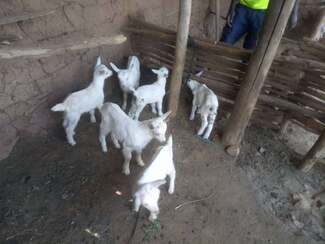 In February and March, 6 healthy kids were born! The program of interbreeding the purebred milking goats from FRED’S FARM with the local goats started, but is on hold at present. This will restart as soon as the 4 new male kids on the farm are mature. The goat milk at the farm is given to the most vulnerable families. The children are selected by the village leader. The mothers bring the children to the farm and are fed there. Via the internet homepage, there is an increased interest from Rwandans and NGOs working in Rwanda asking to buy milking goats, to buy milk, to work on the farm and more. This is a really positive unexpected spin-off from our dairy goat initiative. We are able to direct buyers to Napthal, the man we bought our goats from. Until now we need all the goats and the milk we have. But it is very encouraging to see there is an interest:) Moringa Moringa is a tree. Its leaves, seed pods and seeds have high nutritional value. We propagate these trees from seed on FRED’S FARM. Pascasie, a former trainee from the local school, has been employed on FRED’S FARM since February. Her prime role is to look after the established moringa on the farm, plant seeds to supplement as required, and to spread knowledge through practical follow up in the local community. She has shown herself to be motivated and eager to learn, in addition to being dedicated to her work. She is also trusted in the TWA village. Having Pascasie in the team has made an enormous improvement in the health of the moringa on the farm, and this will hopefully give the needed push to assist the local community including the school, to succeed in growing moringa. TWA Microsaving Since restarting the microsavings after the COVID-19 pandemic, the villagers have saved approximately 800 norwegian kroner. With an individual savings deposit of 1 - 2 kroner, it shows they are dedicated to try to save. Foodsupply Work continues to help the villagers to improve the quality of the soil in the tiny snippets of land between their houses. This in turn helps to produce food. Production of their own liquid fertiliser has started, and looks very promising. Many of the villagers are engaged in this process. Pascasie, our new moringa specialist, has a special responsibility to follow this up in the village. Twa Children to School All the TWA children from the village who attend the local school are supported by FRED'S FARM. Altogether there are 14 school children this year. KIZI SCHOOL, the local school 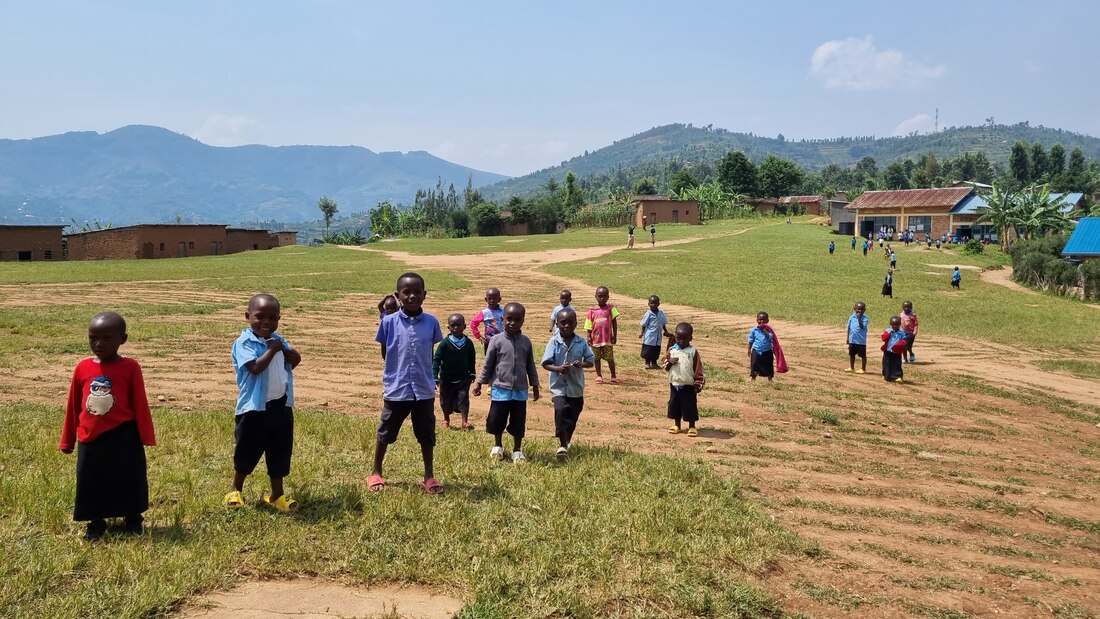 Food at school Moringa was planted again, and will in time, help provide food for lunch. It has been a challenge to get moringa established but this time we are hopeful. Lamp library The solar lamp library we started in 2019 continues to work well. It makes a big difference for the oldest pupils studying for their final exams. The school wishes to target this group. Almost all homes in the area don’t have electricity. So after sunset at 6pm all year round, it is DARK. These lamps have been very well used for 4 years, a few are now broken, a few missing and some have had their rechargeable batteries changed. In our agreement with the school, we take the responsibility to change batteries, fix broken lamps, and dispose of those which are not working as there are no facilities for recycling or waste disposal outside the capital. But in the past year, we see recycling stations for electrical items are slowly but surely being rolled out in Rwanda. Internship on the farm The intern program is continuing. This is a real success story! Three new interns, Nadine Uwizeyimana , Emmanuel Nshuti and Elias Uwitonze began at the end of April. In the course of their 12 week period at the farm, they take part in all the different work tasks, but have a special responsibility for looking after the Demonstration Plot. Educational visits to farm We are in contact with the local school to restart visits from school pupils. This initiative was stopped during the COVID-19 pandemic. Farmers claiming land We are still working to solve the issue of 4 farmers laying claim to land on FRED’S FARM. Taking time to resolve this is part of the solution. 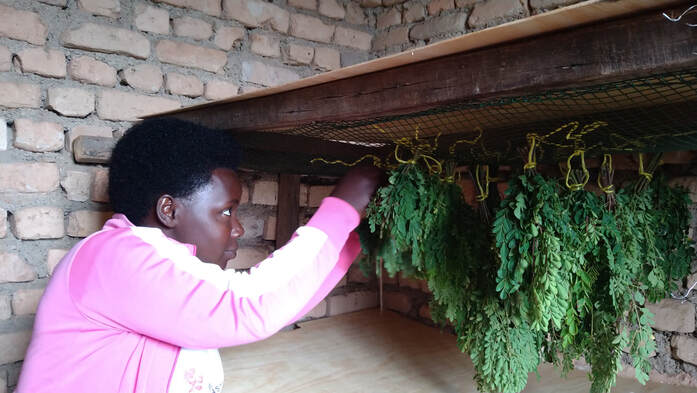 Personal story Pascasie Gatoyi joined our team on FRED’S FARM (FF) in February 2023. She is our moringa specialist! Pascasie attended Kizi school, and was an intern on FF in 2021. She told us then the positive impact of being an intern; gaining skills for use on the family land and for her own future, being able to buy a young goat, being able to pay for her school materials and help her family buy essential food items. In addition, her goat gave her the hope of being independent of her parents. Pascasie finished school in 2022, and since then lived at home with her parents and siblings. Her daily routine was to help on and around the homestead and land cultivated by the family for survival. Job possibilities for young people in the local community are minimal, even for those who have completed a primary and secondary education, like Pascasie. Jacques informs us that for many young women in Pascasie’s situation, prostitution is often the only way to get a small income. So, giving young women job opportunities on FRED’S FARM to gain skills, and at the same time, earn some money, is a priority. THANK YOU to all who donate monthly, and to all who give now and again:) Your support makes a difference every single day! Without the donations these results would not be possible. One of the children getting goat milk on the farm. THANK YOU
This is the start of the rainy season. The dirt and stone road up to the farm was “passable” but we were witness to hail and relentless torrential rain which cuts deep, steep gorges in the hillside road where the road clings onto. Deep holes are carved out in cultivated fields, new “rivers” and “waterfalls” appear in anticipated and unexpected places on the farm. Life-giving rain, but oh so much damage! Overall, there are many positive trends especially regarding TWA and the internship program but as usual there are both set-backs and challenges. TWA 🫡 Kids in general are looking healthier, and more have better clothing. 🙂 More cultivation in their village. 🙂 More kids will be given the opportunity to attend school. 🙂 Microsaving functions well.
School 🫡 More kids to school, increased in the past year from 750 to 915 pupils at Kizi. 🙂 Solar lamp library working well. 🙂 Internship programme continues to function very well. 🙁 Macadamia tree we planted at school died. Farm 🫡 Dairy goats Interbreeding programme is functioning well. 🙂 New strategy to strengthen coffee cultivation, thanks to professional input. 🙂 Macadamia production increased and increasing as trees mature. 🙁 Since Fred’s death, 4 farmers claim ownership to land on FRED’S FARM. 🙁 2 bucks died; one on the farm and one at a farmer. 🙁 Coffee crop 2023 has not improved as hoped. TWA Our first visit to the TWA village is always coupled with a certain trepidation.. What will meet us this time round? What is the general atmosphere? Has the village become any greener? Do the kids look healthier/cleaner/better dressed? This time positive changes were to be seen and felt. Meeting us was not the usual overwhelming flow of people, shouting, waving, pushing and shoving - it was friendly, warm and non-demanding. There are visible signs of improvement, slow, slow changes over the past 8 years. Yes, the villagers still live in extreme poverty, but most of the kids don’t look as sick as before. More children were washed and had better clothing. Small areas were being cultivated, with fruit and vegetables, and we saw several small compost heaps similar to those Jacques had taught how to make last year. And chickens running around, financed by the microfinance initiative we started. Two houses had also planted some flowers! It was really warming to see all these positive changes.
Treatment of “jiggers” (tungiasis) Unfortunately, jiggers is still an issue. The main reason for this is that most families are still living in huts with earth floors. Everyone who needs treatment, is invited to come to the farm for treatment on a given date. Ten children met up, many had one or two parents and siblings on tow. But several came alone. Three of the eldest boys hid behind a tree close to where treatment was carried out, and Providence had to work hard to persuade them to come forward. Two local voluntary health care workers were invited to inspect and carry out treatment. These 2 dedicated people used hours to slowly but surely work their way along the line of patient, grateful children. Most of the children had jiggers on their feet, others also had on their hands. Each child received soap and sandals, as hygiene and protected feet are two important preventive measures. This time round the health care workers will follow up by visiting the families in their homes. KIZI SCHOOL (local school) Internship program for school children This time we could really see the positive effects of the internship program; the impact for the individual students and their families, and the potential for FRED’S FARM activities. Nine of the former interns attended a planting session for iron-enriched beans. They told us about the development of their small projects; Elias told us of how his piglet had now become a mature pig, piglets were sold and one of its first born was given to a needy neighbour. Each had their own story which they told with pride:) Finding the right human resources to help us work towards our goal of reaching out to the farmers in the area has not been easy. Now we see some of the interns can be this resource. One of our former interns, Pascasie, has just joined our permanent staff, and will be trained as a “moringa specialist”. In addition, we are planning to choose another former intern to follow up the interbreeding goat program in the community. This is the initiative to improve the milk production of local goats. We were witness to Pascasie starting her new job. She came “polished” in clean clothes, is well organised, exact in what and how she works, really motivated to learn and gets on well with others. This time round we were made aware of the situation for many young women like Pascasie; finished school and with no job opportunities outside the home farm. Many are pushed into prostitution. So from now on, we plan to prioritise girls when employing former interns. 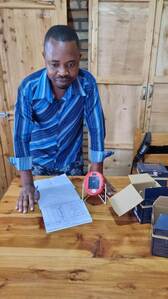 Sun powered lamp library at Kizi school FRED’S FARM established the “lamp library” just before COVID in 2020 and it is still working as intended. We had a meeting with the secretary at the school and went through his records. The library started with 47 lamps, 6 are now missing and 3 are broken. We changed batteries in 6. There had been a change in staff so we don’t know when the 6 lamps disappeared, but reckon it was a “COVID problem”. The school principal and staff are very happy with the initiative and acknowledge the need for lamps for the children. So we will continue supporting this and replace lamps which are lost and damaged. The secretary is aware he must keep good records to track each individual lamp. 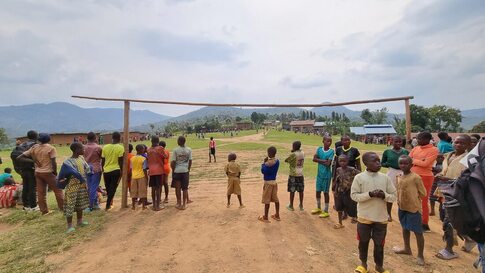 Footballs Kleins A/S Trondheim, Intersport Munkegate TRondheim and Strauss Group Israel, sponsored footballs and pumps for Kizi and Bwama schools. Thank you! Receiving new footballs is always a real highlight for the pupils, and the school leadership. The sports coach told us they are actively trying to promote and support girls' football. Currently Kizi school has 2 male and 2 female teams which compete in inter-school tournaments. He said these new balls mean they will be able to practice before matches with a real football!! Many play football barefoot - if anyone would like to support football boots next time we go to Rwanda, please let us know:) THE SISTERS CLUB The school has a small designated building at the school to provide space for girls who have their period. There's a bed with bedlinen for rest, a shower, a bidet and a toilet. There's no running water, but "the bucket system" is used. In addition there's a metal trunk with clean towels, clean underwear, clean reusable sanitary pads, and clean school uniform skirts. All of this is accessible for girls who need the facility. The metal chest was almost empty so we bought some towels and underwear. Here they learn about conception and contraception, about sexuality, about being master of their own bodies. The girls also learn how to sew their own sanitary pads. Hanne got a crash course in how to make these, and one very wet day on the farm, all girl workers who wanted could join a sewing session. None had used scissors before and most had never sewn, but all were eager:) All necessary materials and equipment is now available at the farm, so on rainy days or midday break, those who will can make these. THE FARM The dairy goats Apart from a few incidents recently with our bucks (male goats), the goats are doing very well. (Four goats have just given birth to four kids altogether, 3 male and 1 female. In addition 2 are pregnant. . ) Both bucks lent to farmers in the local community to provide an interbreeding service are “lost”; one farmer sold the buck, and the other buck died after eating poisonous leaves. Goats unfortunately goats don’t have an “in-house” red lamp to tell them when a foodstuff is poisonous, and cassava, a commonly grown food stables for humans, has poisonous leaves. The farmer who sold FRED’S FARM goat has been reprimanded by the village leader and “sentenced” to either give FF cash or a local goat. Apart from these set-backs, the interbreeding program with local goats in the neighbouthood is working well, 2 kids are born and 4 does are pregnant. All are healthy. The district vet and the village leader have set criteria for which farmers get the free "service" of the dairy goat buck; the female, must be healthy and big enough (at least 14kg), the farmer must have enough high quality forage available, the farmer must have a shelter for the goat, and he/she must be honest. The buck on the farm died while we were there. The vet examined it but could not find the cause. Thankfully there are many healthy pregnant goats on the farm, and just after our return home to Norway, 4 does gave birth producing 3 male and one female:) These 3 young males can in a few months be part of the interbreeding programme in the community, but we will have to buy a new buck for the farm. To find another way to better follow up the interbreeding programme in the community, we are looking into the possibility of employing one of our former interns.
Cultivation on FRED’S FARM Approximately 40% of all the land on FRED’S FARM is cultivated by local farmers and TWA. Those with little or no land for cultivation can ask for permission to grow. Each farmer gets access to land for one calendar year, 2 seasons. TWA have access to land all the times as they have no land themself for cultivation. 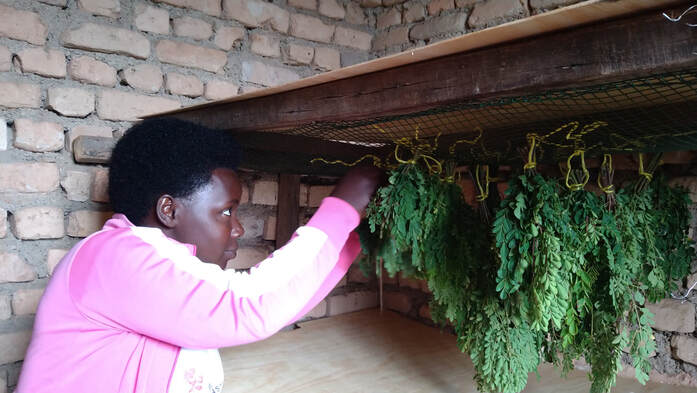 Moringa, “the miracle tree”, management After many years of trial and error, and much reading, we have at last cracked the code to consistently succeed in growing moringa! So armed with this knowledge and with Pascasie, our new employee, to closely follow up the moringa, we should be able to have a good demonstration area on the farm, and gradually be able to introduce at the school, the Twa village and to other interested farmers in the area. Support from Israel A relative from Israel (his father was from Trondheim) joined us for a week to support the project. Opher has a PhD, working in the field of sustainable agriculture in developing countries. He’s a practical academic, with much experience in several countries on the African continent, including Rwanda. Opher provided us with lots of practical input, including setting up a more robust trial with beans on Demo Plot. His presence and input was a real boost for us all, but especially Jacques. In addition his academic position paved the way to improve our cooperation with RAB ( Rwanda Agriculture Board ). Thanks to Opher we spent half a day at the national coffee research station where we learnt, and received plants and seeds! Opher is eager to continue to support FRED’S FARM! So he will be back. GREAT! In addition, Tami, a colleague of Opher, joined us for some days. Tami’s a social worker who works occasionally in Rwanda. She too provided us with valuable social input, and practical help:) A big thank you to both of them!! 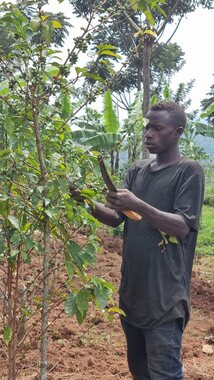 Coffee growing Over time we have questioned our method of growing coffee - it must be possible to grow coffee in a more efficient and more earth- friendly way. At RAB, we witnessed first hand what “cutting-edge” methods are being used in the Rwandan setting to produce coffee. They are experimenting with different forms of “conservation agriculture” systems, but all are following the principles of minimal soil disturbance (no till), permanent organic cover and species diversification. Jacques has bought into this idea, and we have already started implementing these new methods on the farm. This is very exciting! This year's coffee crop does not look as promising as last years. One reason is the weather; the dry season was 3 weeks longer than average. In addition there have been vicious rain and hail storms, damaging flowers, trees, soil and run off of nutrients. But despite the toll of harsh weather, many more trees are looking healthy and robust, so there is hope for the coming years. Also our new methods of tending coffee will in time help reduce the impact of the negative weather factors. Looking after the coffee Macadamia growing Yes, we are producing more nuts but we also have got some small friends in our storage area who have acquired a taste for these delicious nuts. The drying and storage method is now improved, and these little rascals can't cause harm! The macadamia trees are exceptionally healthy, are maturing and starting to produce more nuts. So this year there will be more nuts for sale: Team work with Jacques, Tami and Opher making new safe drying/storage for the macadamia nuts The demonstration plot The perimeter trees, fruit, shade and fodder, and grasses are becoming well established. The moringa planted last year didn’t survive. Our intention in the demo plot is to grow nutritionally rich food, in a way which best utilises the available space. Opher guided the interns to start a new trial with iron-enriched beans to see how best to plant them to get the highest yield. Opher explaining how to plant the beans Beehives and bees To promote better pollination, new beehives will soon be constructed by one of our present interns. Other visitors Tomas, Ole, Kenneth and Toni, four 19 year olds from Trondheim, visited the farm for a day. They joined the workforce to plant grasses on the coffee terraces, had a guided tour of the farm and then asked if they could play a football match at the local school:) The sports coach invited one of the girls teams to challenge them - a tough match for both teams!! The boys joined the workforce for some hours, Thanks! COFFEE for SALE Forty five kilos of green coffee filled our suitcases on return from Rwanda. The coffee will be roasted on Saturday 18.02. at Cafe Le Frere, Søndre gt. by the owner Kjell Harry Lyngaas. This is one of the ways Kjell Harry supports the project. Many thanks!! We'll send and email once the coffee is ready for sale. To each and every one who either supports FRED’S FARM every single month, or who gives a donation now and again. Thank you for making all of these changes possible:) Hanne and Sten Rwanda is returning to a new normality after COVID, and at present no restrictions are in place. For the project, we are adjusting to the reality of Fred's passing, and Jacques has risen to the challenge of having total responsibility on site. The general price rise in Rwanda is being felt by everyone, and for the project, we will notice increased wages and general cost of goods. WORK ON THE FARM The dry season lasted from mid May til mid September. No rain fell in this period, and there is less activity on the farm. The most important task is to keep plants alive. No rain means no growth, so no weeding and nothing is planted. This year the interns made more robust shade constructions to protect the young, vulnerable moringa trees and were more attentive to apply mulching. This resulted in a higher survival rate. The coffee seedlings planted in February struggled and many died despite regular watering. A worm tea bed is constructed on the farm. This is a composting system where "run -off" liquid (worm tea) is collected. On the farm the worm tea is used primarily on the coffee and macadamia as a pesticide and to strengthen. This worm tea bed will be used as a demonstration site for local farmers. Our aim is that farmers will collaborate to build a worm tea bed together. ( Picture below) Fences are constructed around many macadamia trees. Farmers with little or no land are invited to plant crops between the macadamia but it has been a challenge to control exactly where crops are planted. Now the fences define where the root system is and prevent planting too close. (Picture below) Compost heaps: altogether 25 large compost heaps are made on the coffee terraces. This is one of the ways we improve our soil quality as we have less manure from animals. (Picture below) Maintenance; repairing the cement base around the homestead building, roof repair, fences, etc. Torrential rain and high winds leave their toll! (Pictures below) SCHOOL UPDATE The interns come as usual to the farm through the dry season. Their prime job is shading, renewal of mulching and watering. Yet another "trio" have successfully completed their 3 month internship period! We are so proud of Jacques who so diligently follows up and motivates these young students, making an immediate and lasting impact on their own and their families lives. (Pictures below - Certificate and harvesting peanuts (food for workers) TWA The microsavings capital provided in February has grown by an amazing 50%! Beans were bought at harvest time, stored and resold later in the season for profit. A truly successful business initiative:) Cooking stoves: many have now built in their homes, not exactly like the prototype... but at least they're less of a hazard for children than a bonfire, and hopefully use less firewood. FRED'S FARM provided bricks, and a day's salary for each person who built one. (Pictures below of two of the stoves) Compost made in February was shared between all who helped make it. The villagers were able to grow beans and maize. In early September, 30 villagers met to make a new compost heap under JAcques and Providence's guidance. FRED'S FARM buys lime and pays for a day's work. There is a dire need to improve the soil quality in the tiny areas around the houses in the TWA village to make it possible to grow some food. (Picture below) COWS The last cows on FRED'S FARM were sold early September. This is the end of an era. We would like to thank all sponsors who have specifically supported the cow programme through the years. This programme lifted many, many families providing milk, income and knowledge. Since 2018 we have been working towards a more sustainable way to provide milk through introducing dairy goats. DAIRY GOATS FRED'S FARM has lent a dairy goat buck to the village leader, Innocent, and an interbreeding programme with local goats is now in place. Jacques supports Innocent in his efforts to promote the programme in the community. So far 7 farmers have brought their female goats for servicing. This is a real milestone! (Picture below) RAINY SEASON This is the season of high activity - to maintain, improve and develop the farm. This is the weather window to plant for short and long term; seasonal crops and trees which take 5 - 10 years to reach maturity. This is also the season for the farmers we invite to grow crops on FRED'S FARM to start their planting. This is the main crop of the year, the one which provides food for the family and the hope of some extra which they can sell for much needed cash for small essentials like salt, soap, in addition to school uniforms, paper and pencils for their children. Jacques has prepared well and has both seeds, saplings, tools and more manpower ready to start. He is in contact with the school principal to prepare for planting moringa seeds at the school to provide more food in the future for school lunches. THANK YOU to all who donate monthly, and to all who give now and again:) Your support makes a difference every single day! Support the project. Use the Support button below😀
Back home after 3 demanding but fruitful weeks. Being present in person is a time for getting an overview of the status of the land, the staff, the animals, relations with others and more. It’s a time for decision making, for finding alternative ways to do things, to scrap “good ideas” and being open for “new ideas”. And prioritising. But perhaps most important of all, it’s a time to open our eyes and ears to the realities of the area we are guests. The COVID situasjonen in Rwanda was “under control” and didn’t limit our work; organised test and self-isolation regimes and facemask use in public spaces. Rwanda reports the highest vaccination rate in Africa with over 60 % fully vaccinated. During our visit we had a meeting with the socio-economic development officer (SEDO) in the area. This area is one of the poorest in the country. After our meeting he went on his way to encourage people in “his” area to get their COVID vaccine, booster dose! An example of a just system! We spent more time with the TWA, and felt a very positive change - it was easier to present new initiatives and more people were interested in taking part in “activities”. COVID was a very difficult time for them, many with limited or no access to food. Our farm foreman, Providence, told us many have realised the need to be able to support themselves in a different way than before i.e. they cannot just survive from day to day. Collaboration with the school has also improved. The new school principal is forward thinking. He actively promotes helping his most vulnerable pupils and sees how FRED’S FARM is a tool to do this. The potential in the school garden, used for providing food for the school lunch, has been developed. Experience has shown us that meeting “officials” can be challenging; time schedules, weather and changes in priorities. This time round, better planning and persistence gave results - we got to meet the “SEDO”, the district vet and the district agronomist. These people give us a good insight into government policies and how they affect the people in the area we work. In addition, together we are able to find better solutions to different challenges. In general we can report many positive trends in the project 😀 Highlights:
Picture: The staff and day workers one day at the farm Internship program for school children This initiative started last year and functions as we hoped. All 12 students, past and present, were invited to the farm one Saturday. They told us about what they had learnt during their internship, and about their "business project" which the project has supported. Each described the short- and long term benefit for themselves and their families. It was really heartwarming to hear how these young people are planning for their future by participating in savings schemes at the school and in their local community, by buying, rearing and selling animals, by planting fruit trees which will provide a cash crop in the future and making improvements on their home plot. The school principal also reinforced everything the pupils told us. Picture: Interns transplanting moringa seedlings Microsavings for TWA The microsavings programme collapsed during COVID when, in despair, the TWA were forced to use the money to buy food. Twenty seven families now came forward to participate in the programme, 15 more families than before. We have provided new start capital. We encourage to save to enable more children to attend school. At the end of this year, we have committed to pay half of what it costs to send a child to school when the savings group pays the other half. In addition, short term loans are given to start small businesses, to buy essentials like salt or soap, medical treatment and more. Interest is paid on the loan. The group itself administers the programme. Pre-COVID this programme functioned well. Picture: The newly selected committee for the Microsavings account. Treatment of tungiasis, “jiggers” Sixteen children from the TWA village were treated for jiggers. This was the first time we were witness to this painful condition. A small parasite enters the skin especially on the foot (between toes and beside the nails) causing local inflammation and sometimes infection. The school doesn’t permit children with this condition to attend school. Picture: Treatment of jiggers Sun powered lamps The “lamp library” of sun powered lamps we supplied to the local school works well for both pupils and staff. The school secretary follows up, and no lamp has been lost so far. The lamps have been used extensively. Five of the 47 lamps are taken back to Norway for servicing. The Goats The dairy goats are healthy and after 3 long years, we were in the position to start the interbreeding programme with local goats. This was initiated while we were there!! FRED’S FARM now produces enough food for our goats:) Picture: Happy goats running home after grazing on the farm Cultivation on FRED’S FARM Approximately 40% of all the land on FRED’S FARM is cultivated by local farmers and TWA. Those with little or no land for cultivation can ask for permission to grow. Each farmer gets access to land for one calendar year, 2 seasons. The TWA have access to land all the time as they have no land for cultivation. It was wonderful to see first hand that the TWA now cultivate a much larger area than before, and it's better cared for. Jacques ensures the area provided has good soil as the TWA have no access to animal dung. Moringa management After much trial and error, we have learnt that it is a demanding process to germinate moringa seeds and to ensure they survive their first few years. They are very sensitive to too much rain and too much sun, and when transplanting seedlings, the slightest damage to their roots leads to the plant dying. Two terraces are now established “moringa terraces” with 2 different methods of planting. In addition moringa seeds were planted while we were present on the Demonstration plot. The local population now have a genuine interest in moringa, and are eager to try to grow them. In addition, the district agronomist and the district vet asked for seeds. Moringa seeds will be propagated at the school garden in the coming weeks. Picture: Moringa flowering on the farm Food for field workers on FRED’S FARM More food is being produced so we can provide “something” to eat at the midday break; avocado, papaya, tree tomato, banana, peanuts and more. The fruit trees planted in the past 4 years are slowly but surely reaching maturity and bearing fruit. The demonstration plot The interns have established a demonstration plot. The perimeter has fruit trees, shade trees and napier grass (animal fodder). Moringa is planted along paths. Various vegetables are planted; eggplant, sweet potato, peanuts, maize and beans. Also lemongrass. In addition we planted a trial area with new iron-enriched beans using 2 different methods; one method requires much less wood to stake i.e. less work and more sustainable in a land with limited wood resources. Picture: Overview over the demonstration plot Coffee and Macadamia The coffee harvest this year is looking promising. Never before have so many bushes produced so many coffee cherries. Improved management and hard work are giving results! The eldest macadamia trees planted approx 6 years ago, are now reaching maturity and have started to produce nuts. The youngest trees planted 2 years ago are very healthy. Picture: One ripe red coffee cherry and many unripe green. Picture: Macadamia nuts Bamboo It was a real disappointment to acknowledge the reality that all of the bamboo plants which were planted along small streams leading to the main river in the valley had been removed by farmers who cultivate along these streams. The district agronomist was ashamed of this act of “sabotage”. The reality is that the farmers see bamboo as a threat to their crops. So despite the fact that the local authorities gave us access to plant, farmers have attended meetings with Jacques and local leaders, the farmers themselves were employed by us to plant and weed, and our intention was to try to find business opportunities with bamboo, nevertheless the immediate need for food left the farmers uprooting the bamboo. All of the bamboo planted along the main river are alive and well. In this area the government has a follow up system. In relation to soil erosion, this is the most critical area. So now, we will plant some more bamboo in an area along a few small streams very close to FRED’S FARM. In this area Jacques has a good dialogue with the farmers. To plant on a larger scale for commercial purposes at this time will not be followed up. Lemongrass oil Over the past 3 years we have planted and transplanted lemongrass around the homestead. It thrives. This time round, we dried it and also did a trial to infuse oil. The dried leaves can be used as a herbal infusion and the oil can be used as flavouring. Both are back in Norway and for sale, income goes directly to FRED’S FARM. Picture: Infusing oil with lemongrass New cooking stove A prototype brick and clay stove was made at the farm. This uses 75% less firewood than traditional “3 stone” open fire, has markedly less smoke thanks to a very small fire chamber and is less of a fire hazard for children. Eight TWA ladies brought clay to make the stove, and participated in constructing it. Afterwards, Alice, the village leader built one in her own home and several others planned to make one. Picture: Bosco very happy with the new stove Picture: The TWA ladies helped with their knowledge to build the first stove Compost at the TWA village The TWA have maximum 2 metres of land around their homes. In general, the soil is hard packed and non-productive. To improve their soil, our agronomist, Jacques, invited the TWA to a training session at their village on how to make a compost heap. Everyone who wanted to take part could come - a strong motivation is that all who participate get a day’s salary. But in reality, every single person who came was active and interested. As we approached the TWA village that afternoon, we saw black clouds approaching and heard thunder in the distance. The villagers had already chosen a centrally placed site for the compost heap, all the ingredients for the heap were gathered, and all 27 people stood ready for action with 4 machetes and 1 hoe. As the thunder and lightning grew closer, the tempo increased - never has a compost heap been constructed so fast! By the time the torrential rain arrived, and the thunder crashed around us, the job was complete. These short 20 minutes are a decisive step towards a hope of slightly more food production on the scraps of land at the TWA village. Picture: Everyone helping to build the compost Beehives and bees Once the rain passed and the sun broke through, the bees from our beehives made their presence felt. A “buzz” was ever-present:) When built originally, the beehives were in an area away from human activity, but now the demonstration plot is close by. So beekeeper Alexander is looking for a new position for the hives, and the plan is to move them when the time is right:) Pictures: Bosco and Daniel were very grateful for their new "wardrobe". Picture: We met 3 of the 6 TWA kids we support at the school. The children from the TWA village attend Bwama primary school. We've never visited there before. As we entered the school compound the rain was bucketing down and thunder was in the air. Dozens of children "flowed" around us, called "good morning, what is your name?", climbed into the window openings to get a better look at "mazunga" (white man) and, for the brave ones, tried to get close enough to touch our white skin with a tentative finger tip! Emmanuel, Fabrice and Divine from the TWA village have met us before, so they were happy to escape into the staff room to talk to us. They told us how they like going to school, all do well in their class and they like different things (maths, reading, football). On this visit we learnt that school lunch at this school is not free for the most vulnerable. So none of the TWA children had paid for school lunch, and hence got no lunch. From now on, the sum for lunch will be included in our support to each child. Picture: We are helping to improve the school lunch supply. Here planting a macadamia tree. Coffee for sale 35kg of green coffee returned with us from Rwanda. This time all the coffee is natural processed coffee instead of washed coffee. This gives a more complex flavour. Today the coffee was roasted at Cafe Le Frere, Søndre gt. by the owner Kjell Harry Lyngaas. He does this to support the project. Thanks !! A mail will be sent out once the coffee is bagged and ready for sale. Hanne and Sten Summary of 2021 and plans for 2022 2021 The year was marked by COVID-19 but we managed to keep all basic activities up and running. Arne Ivar from Trondheim was on a day visit to the farm in September. Otherwise, no visits from Norway. The main consequences of COVID-19 on our activities:
Some statistics 2021
Twa's beans planted on the Farm Work on the Farm Economy We managed to balance income and the cost of our activities well in 2021. Due to COVID-19 only a small quantity coffee was available for sale in Norway, so income was primarily from donations. We prioritized providing work for as many as possible to give some income, initiating work like bamboo planting instead of giving more emergency food. See annual report and annual account under Organisation tab for more information. 2022 Main goals:
MORE DETAILS for 2022 In 2022 we are prepared for the uncertainty and restrictions COVID-19 imposes in Rwanda. Sustainable farming “Start-up package”: we have an overall idea to offer local farmers a “start-up package” with animals and plants which are optimal in relation to available land, resources and nutrition.
Support the school/more children to school
Sustainable farming
Cash crops: coffee and macadamia To look after coffee plants and macadamia trees is labour intensive, so FRED’S FARM provides work for many. In the future the income from these cash crops will give income to FRED’s FARM project and cover most of the running cost. We are continually looking for better methods to care for these crops. Bamboo planting The bamboo planted last year to stop erosion of farming land in the river valley bordering to FRED'S FARM. These plants require follow-up over the coming year to establish a strong bamboo belt along the river. Once big enough, bamboo can be used as a building material for the farm and we will look into the feasibility of establishing a small bamboo workshop. Picture- The six Twa children supportet by the project in their new uniforms, January 2022. Thank you again for all the support to the project 😀 You can read about the project in SKJETLEIN school paper from december 2021
|
Details
Categories |
||||||||||||||||||||||||||||||||||||||||||||||||||||||||||||||











